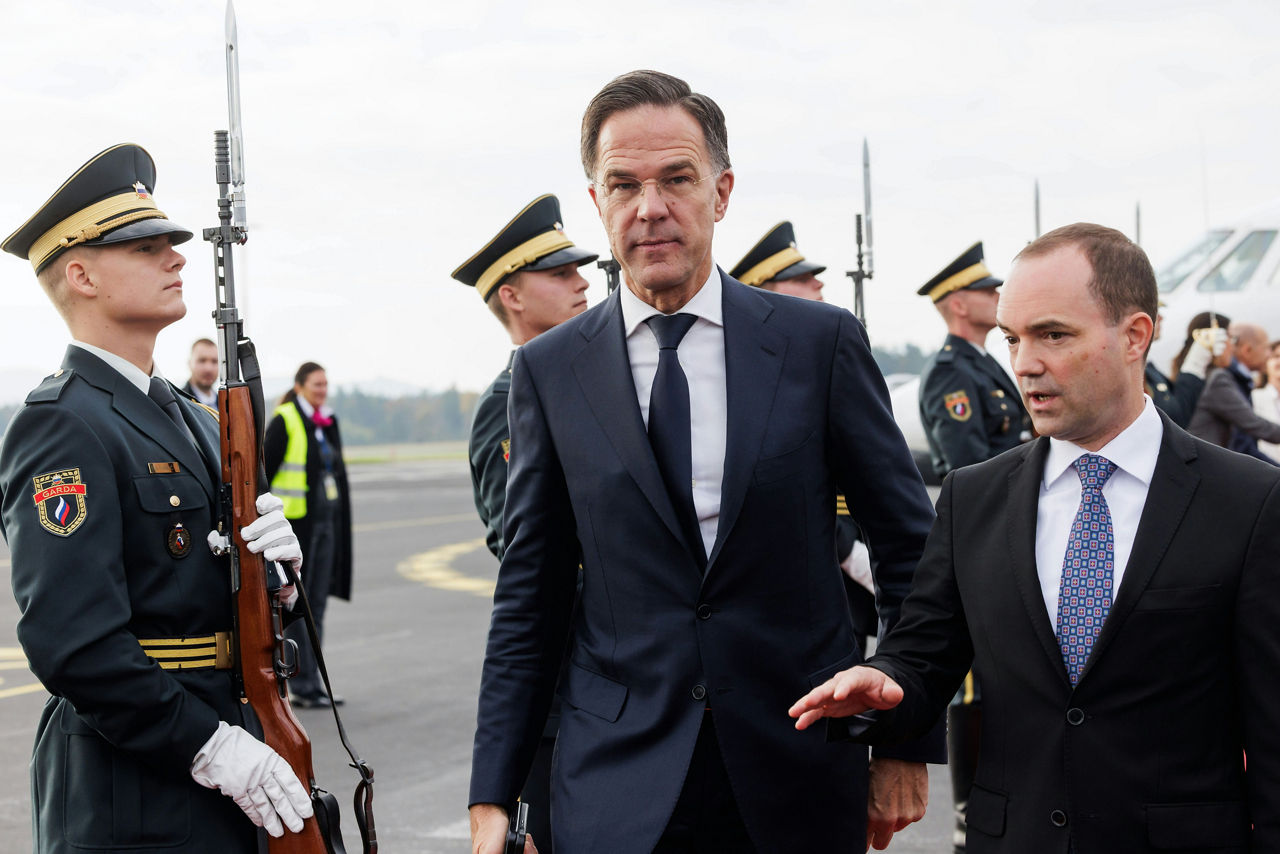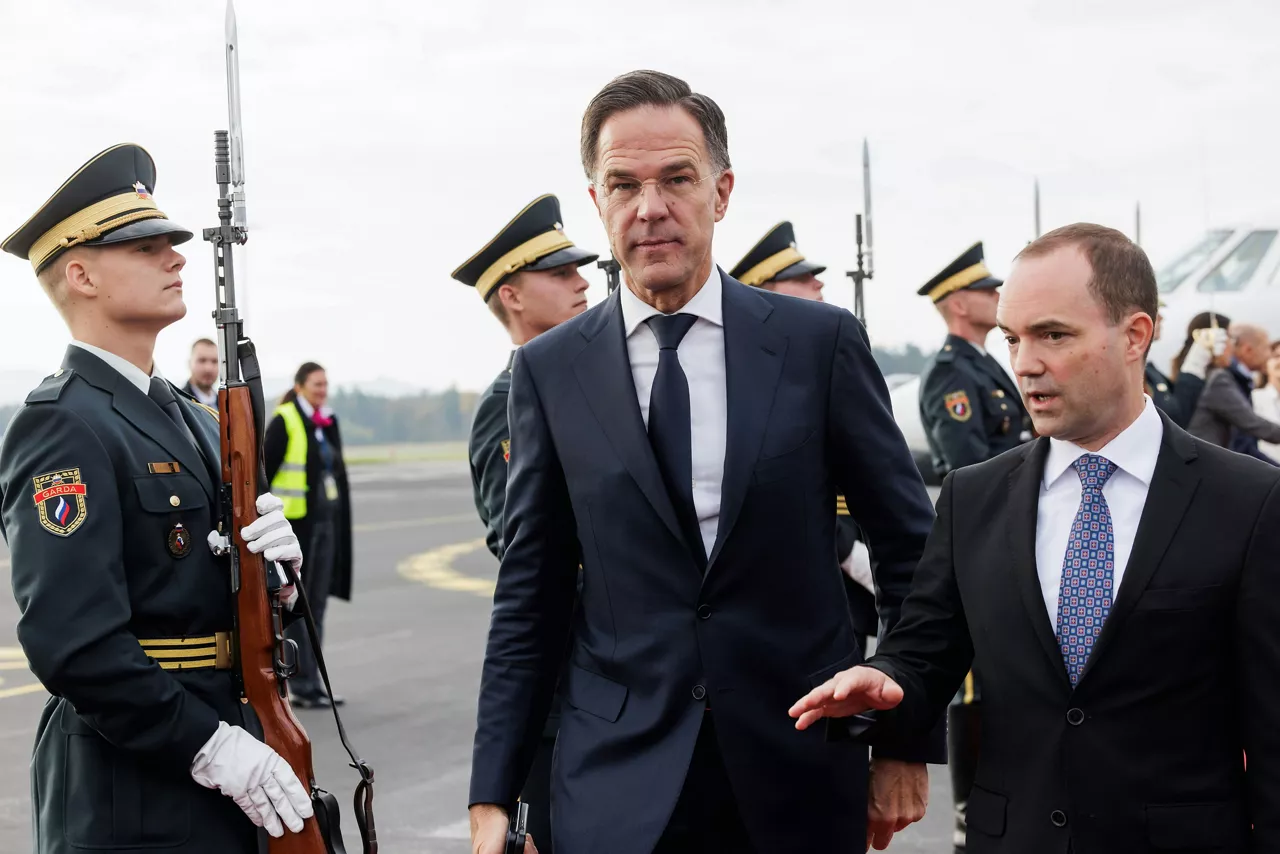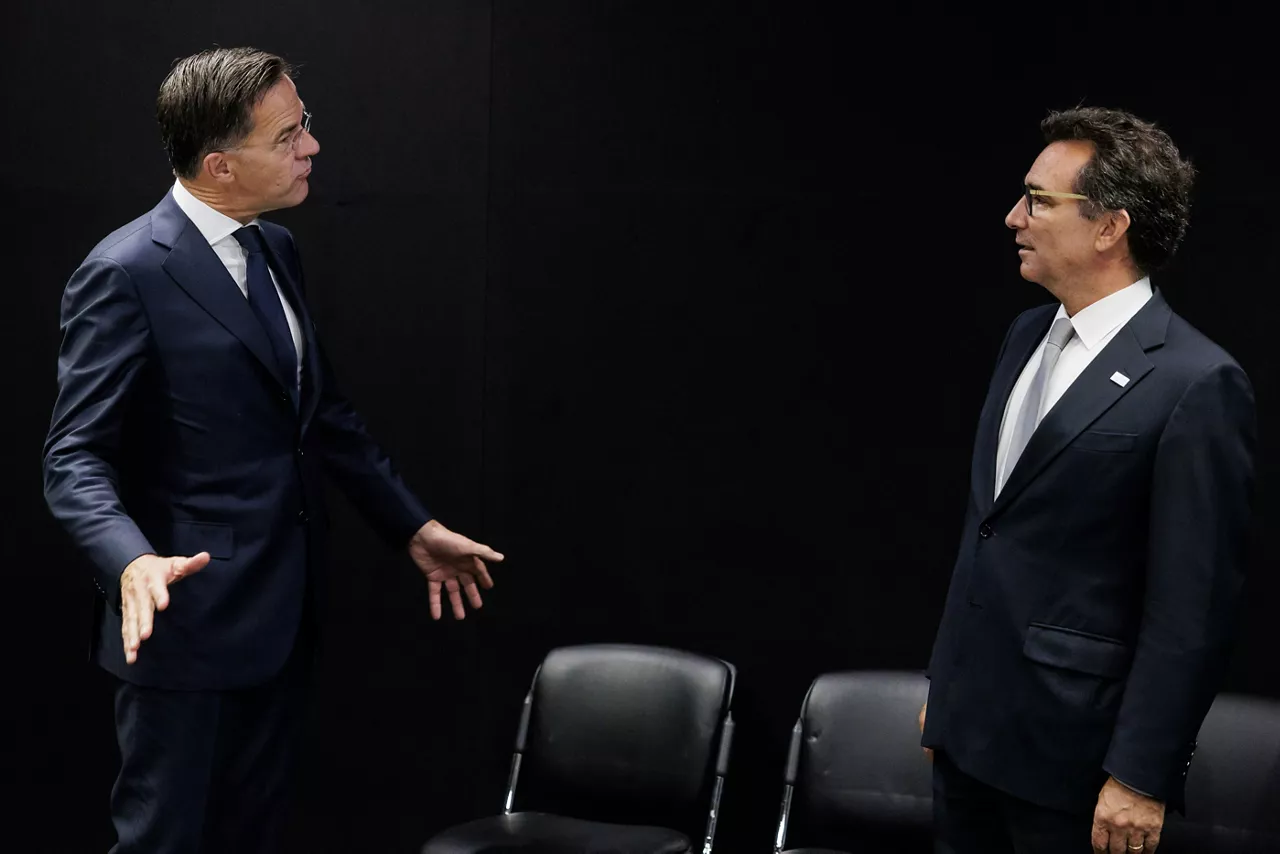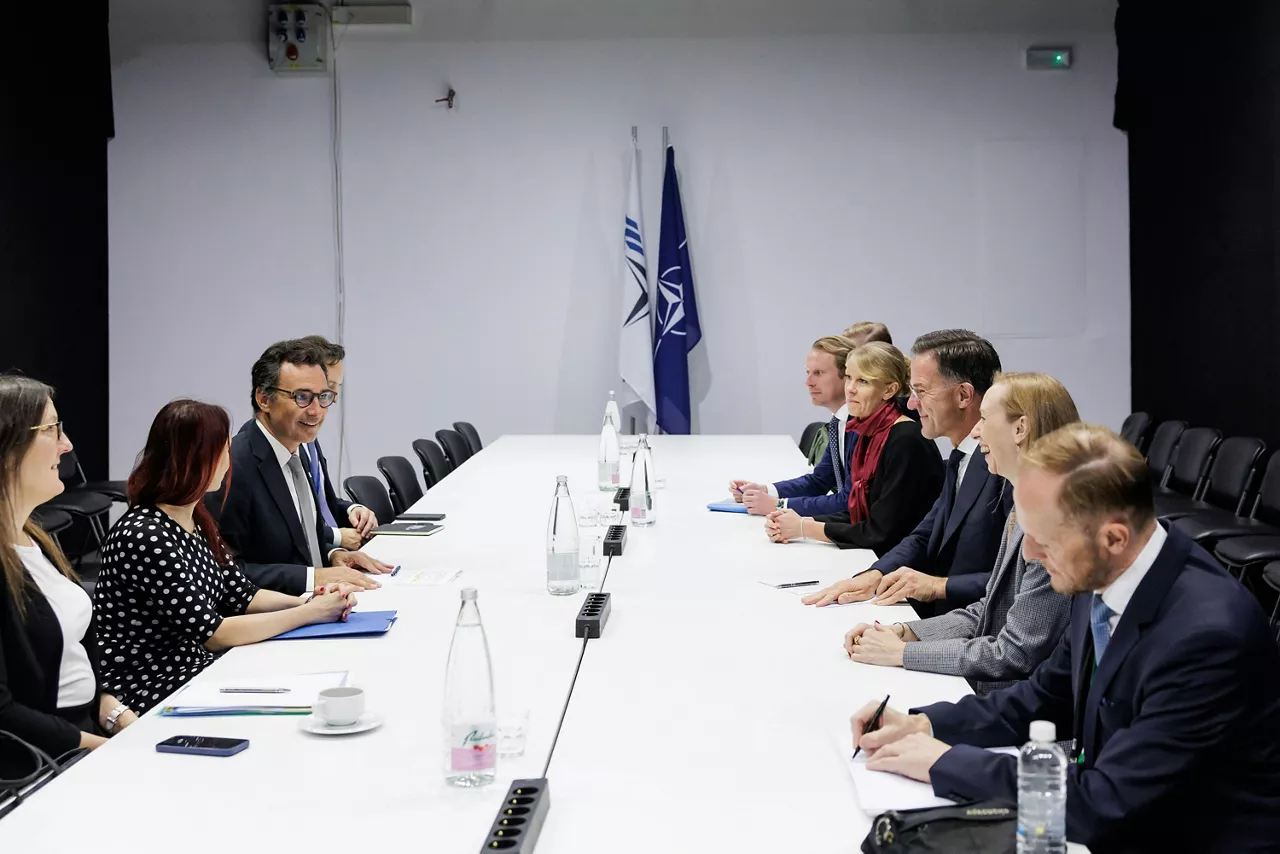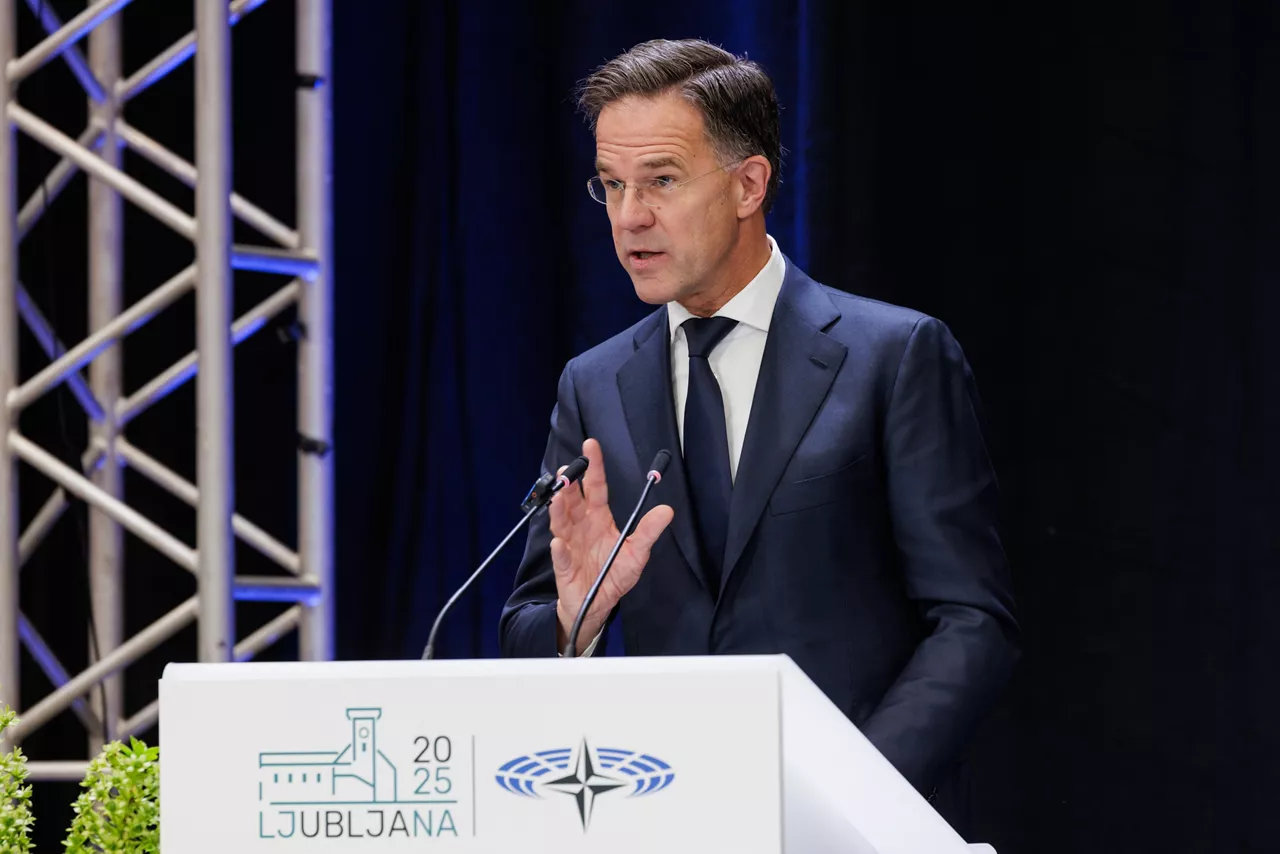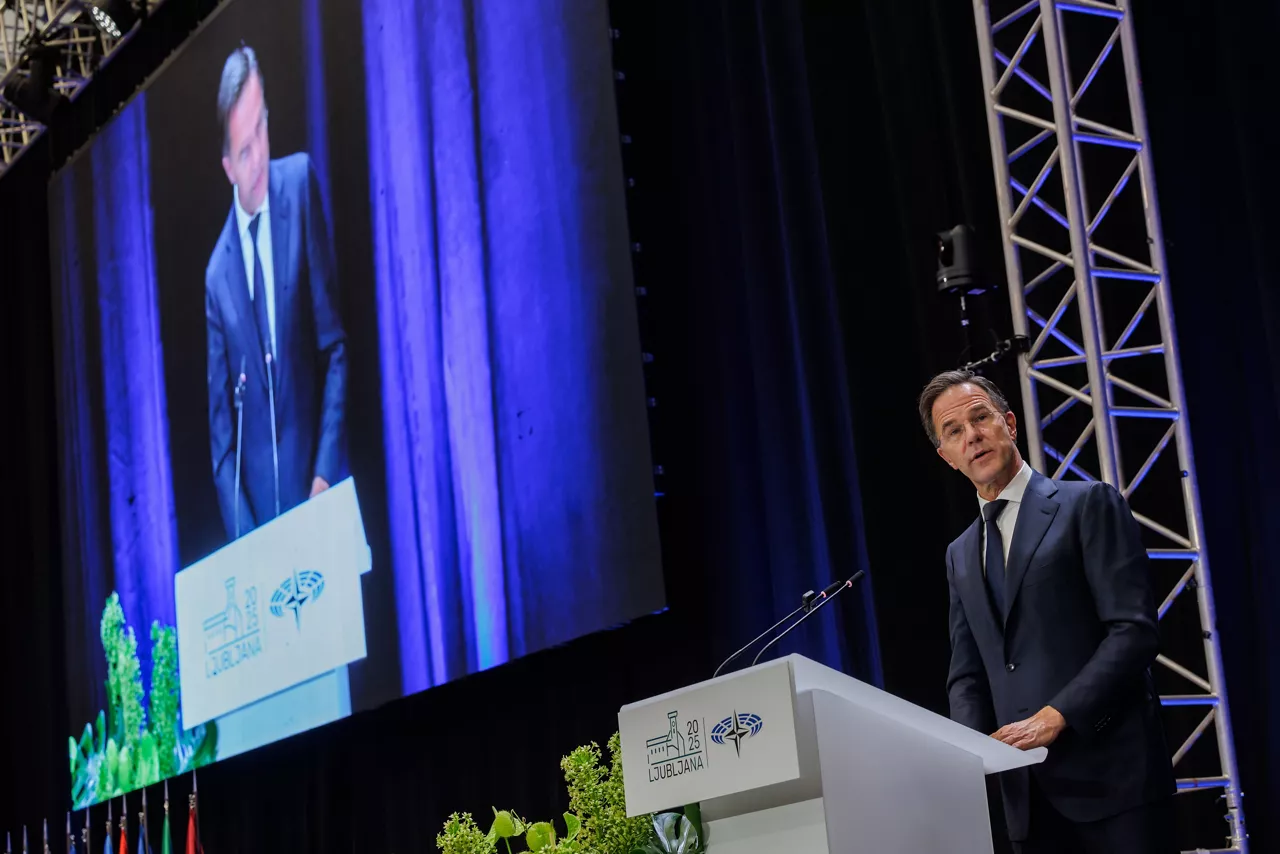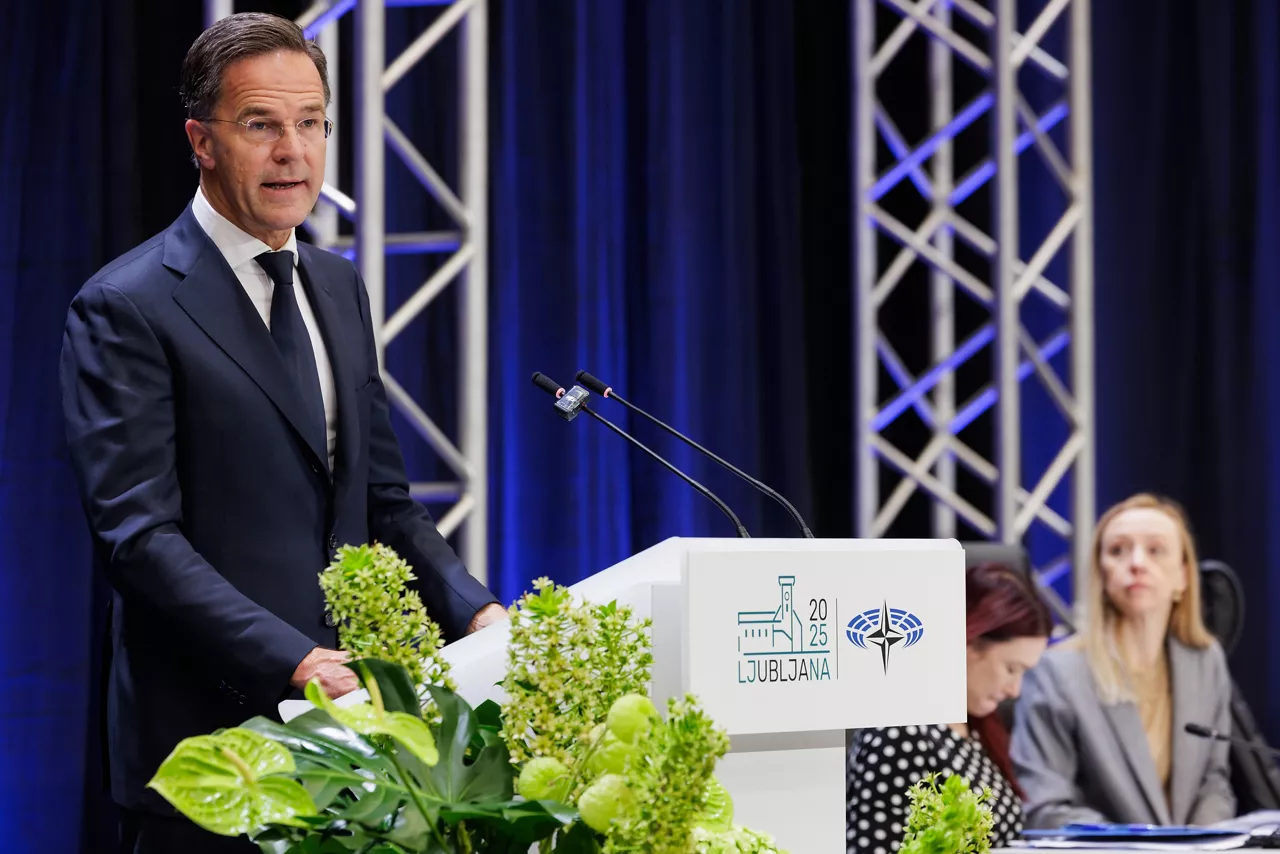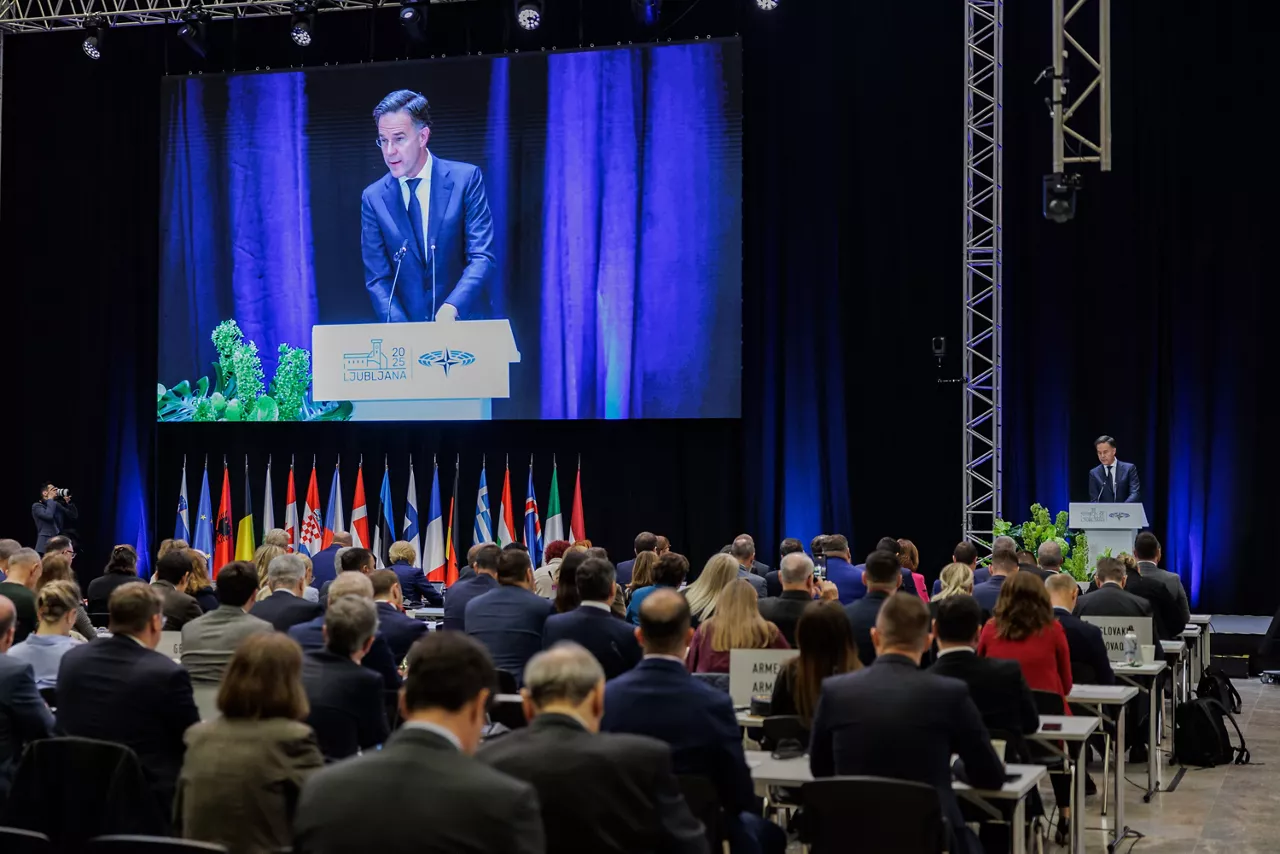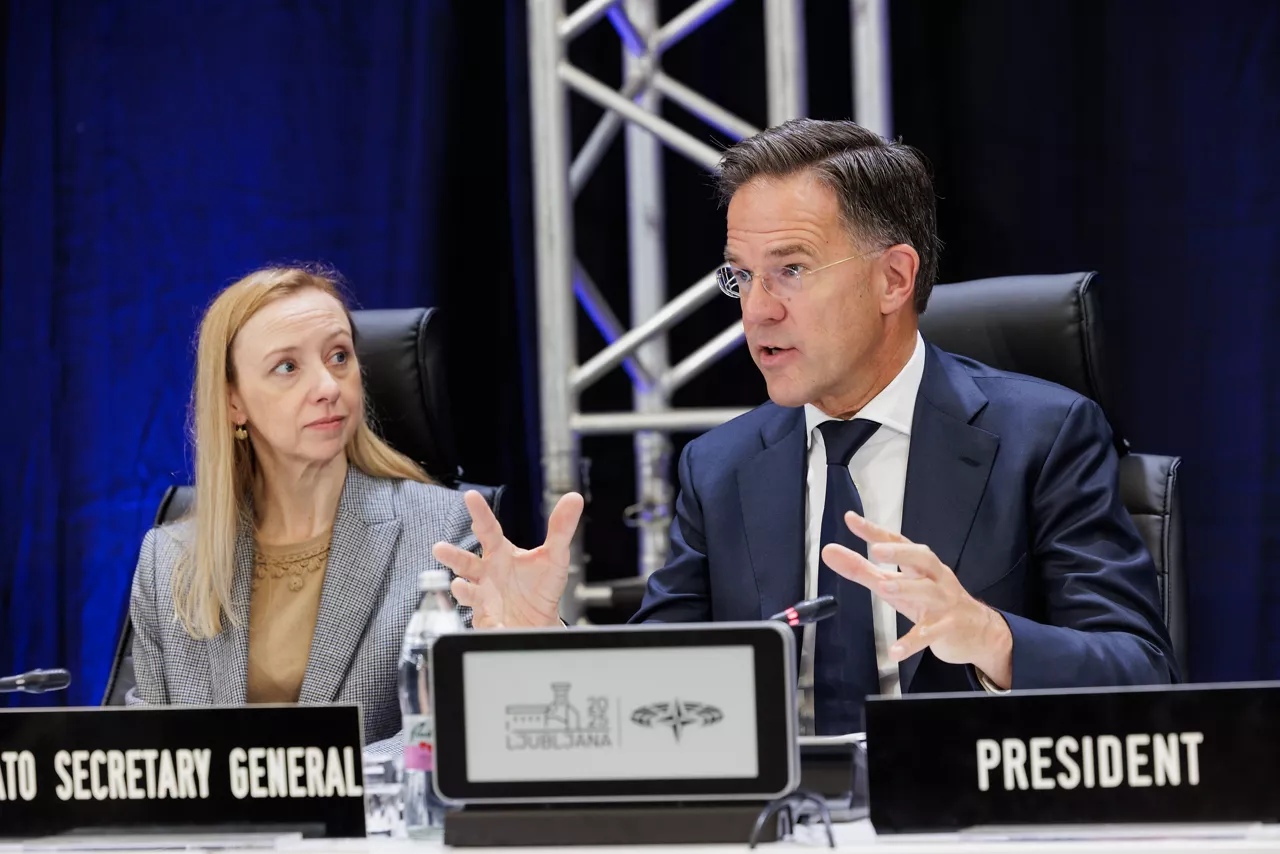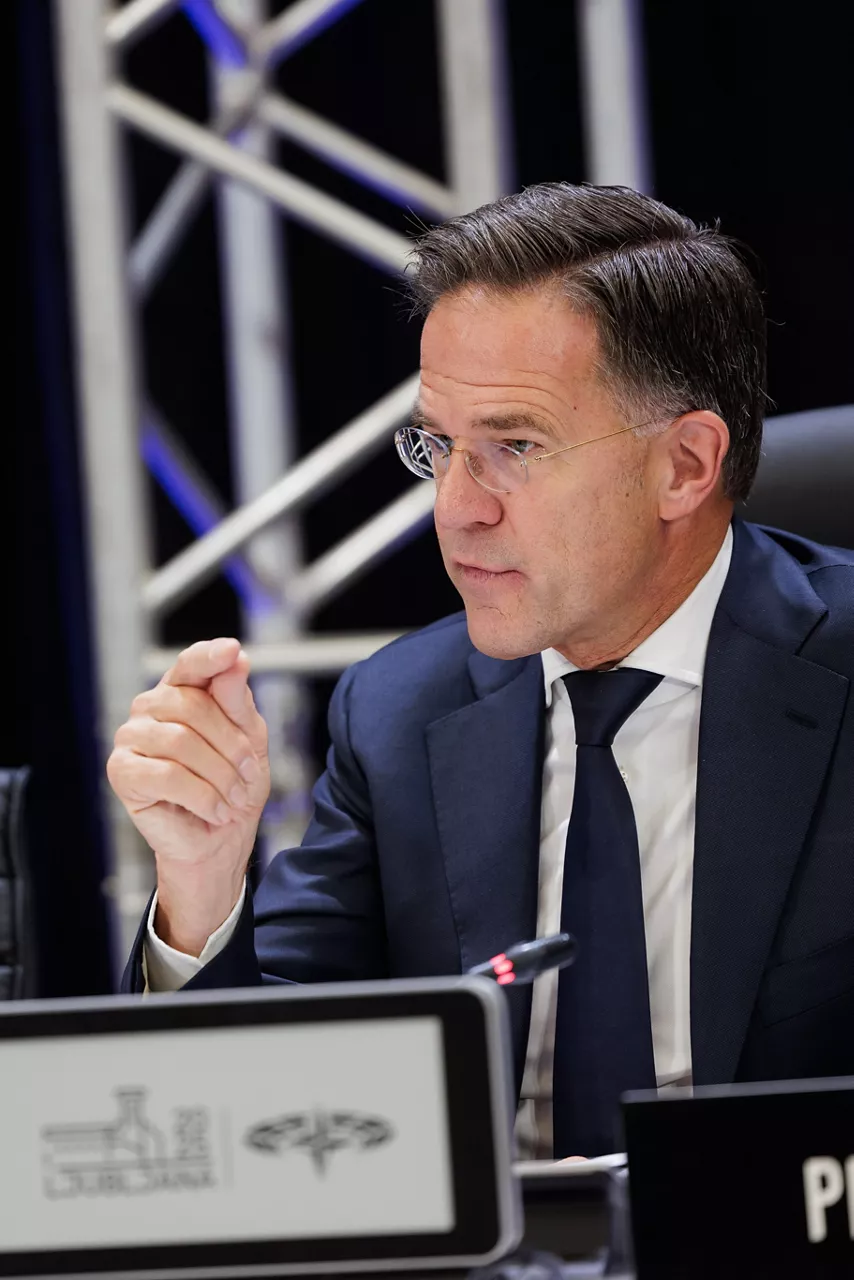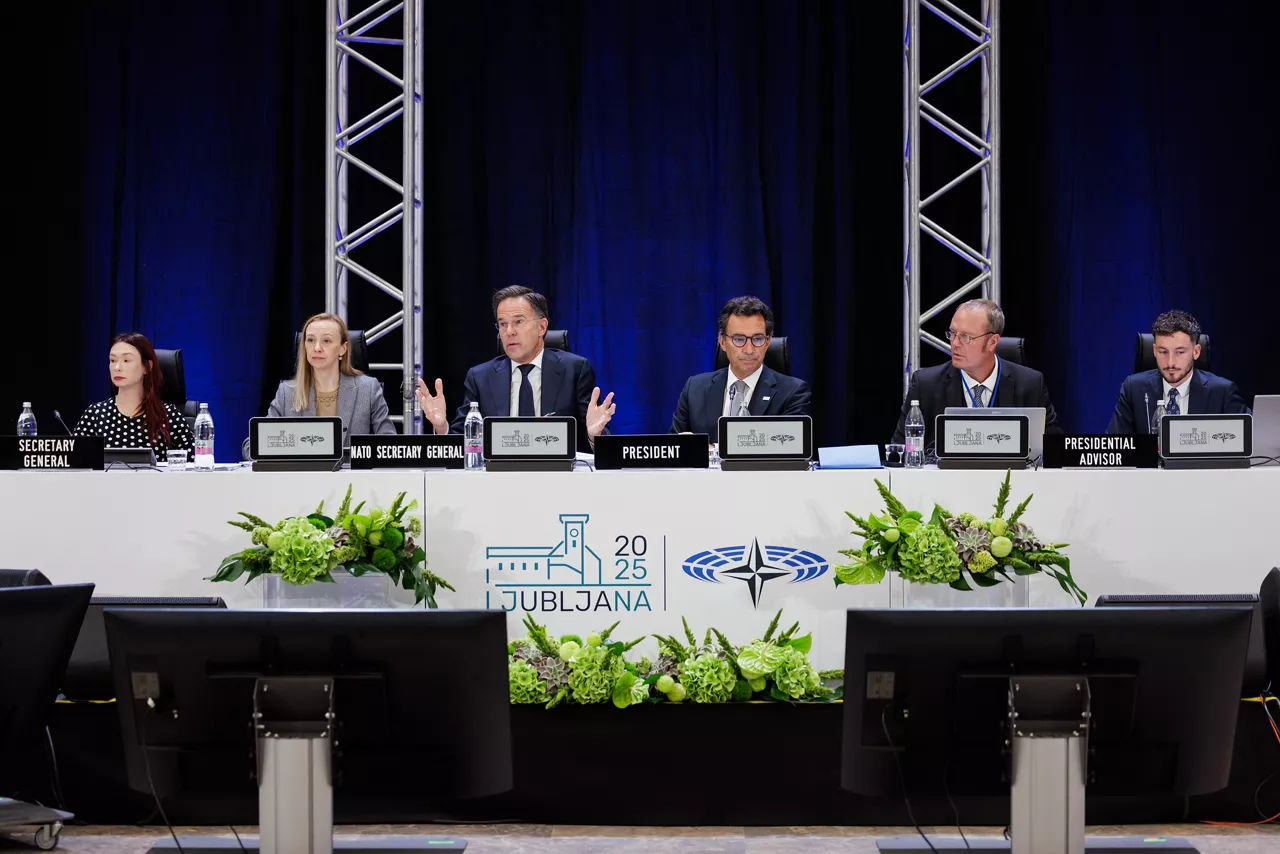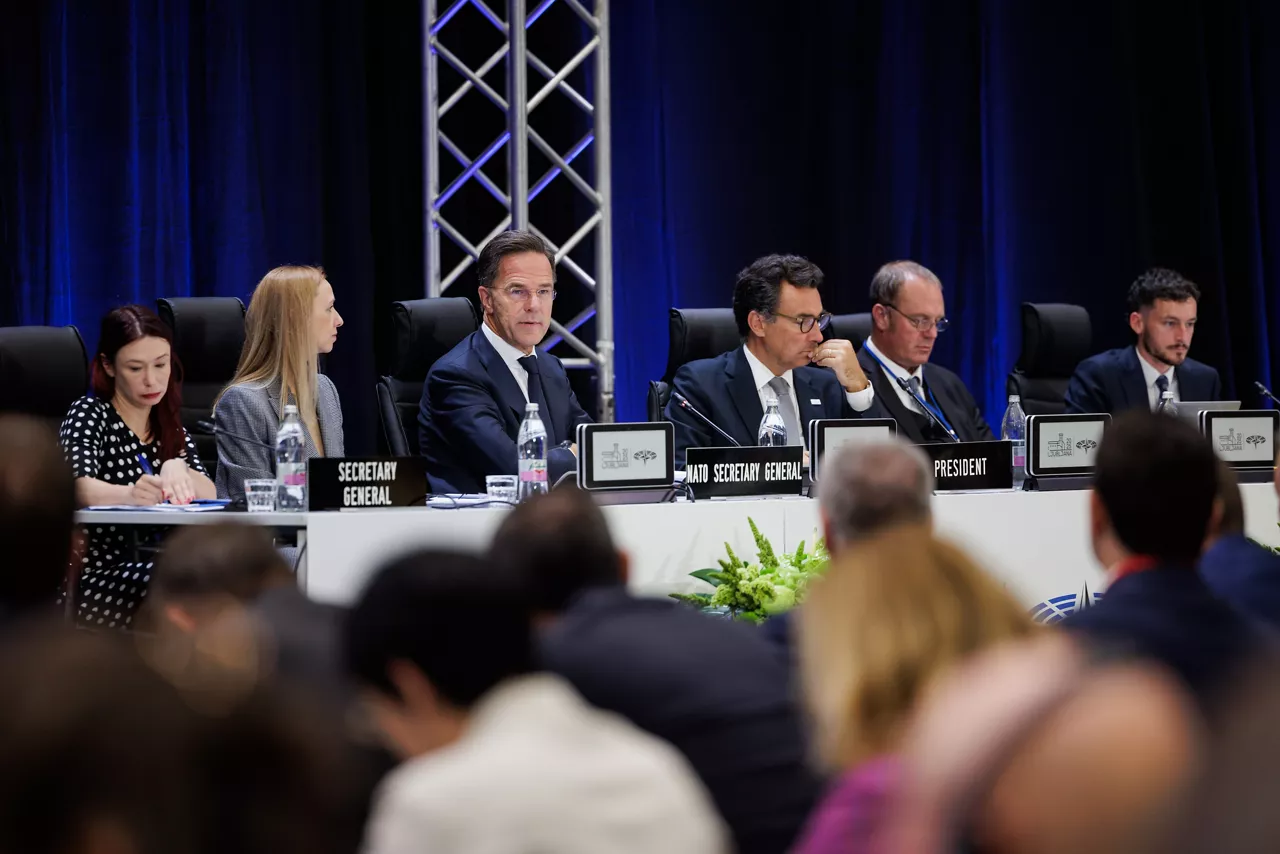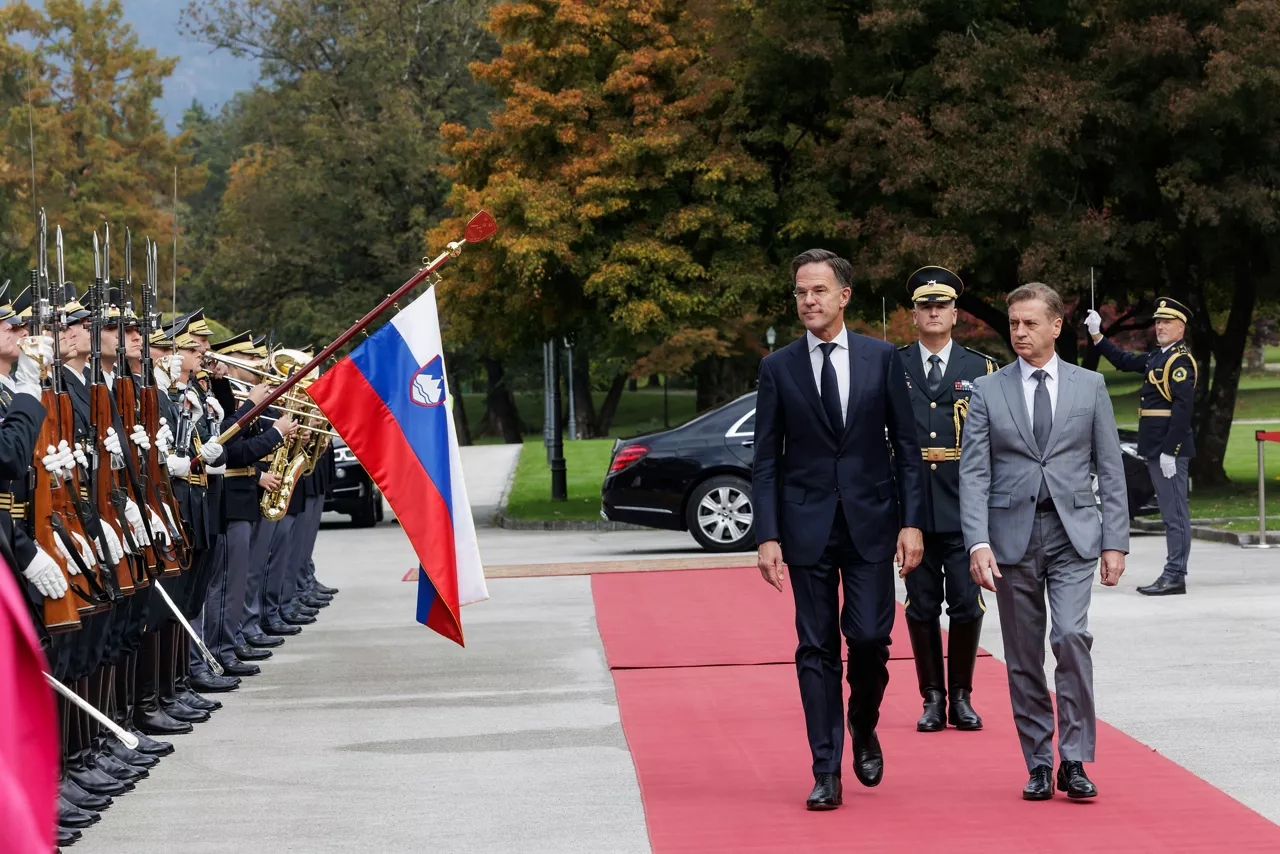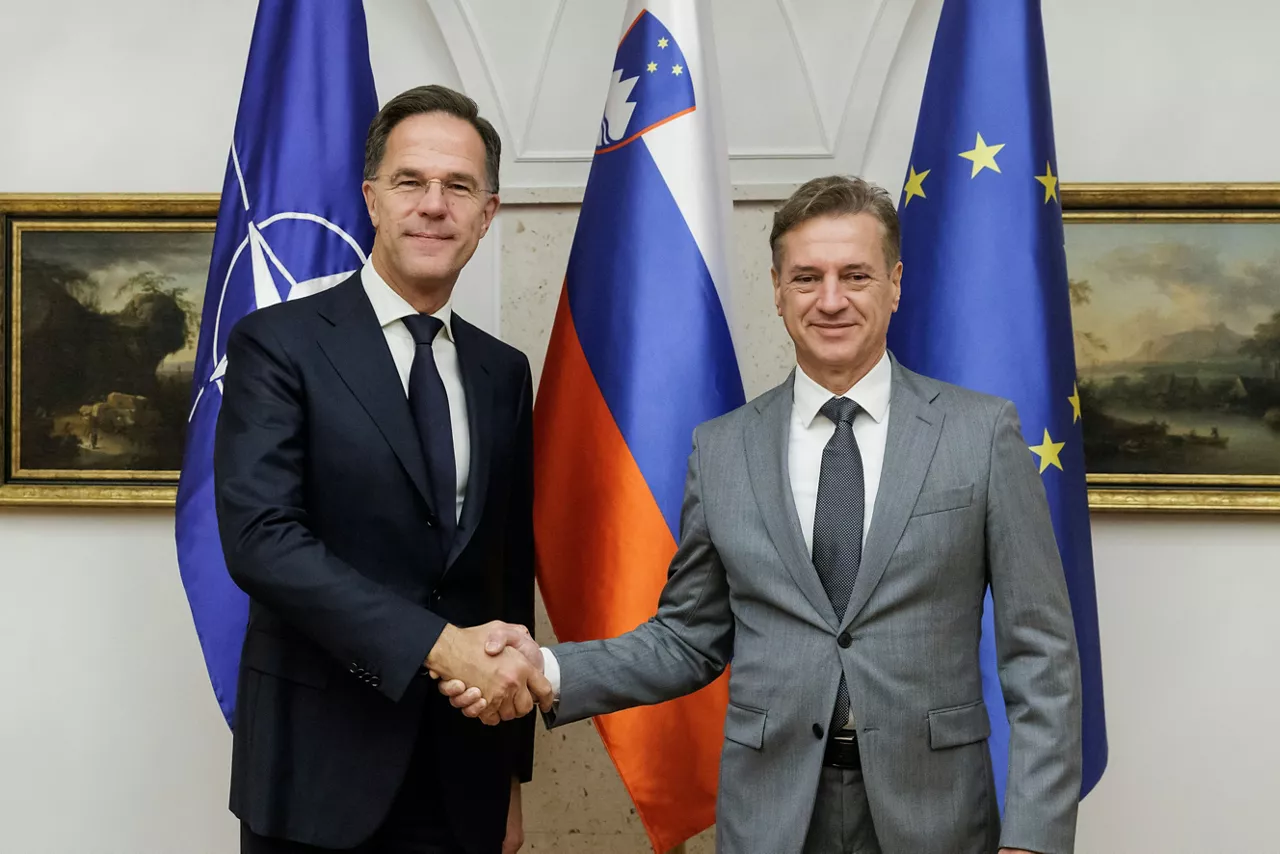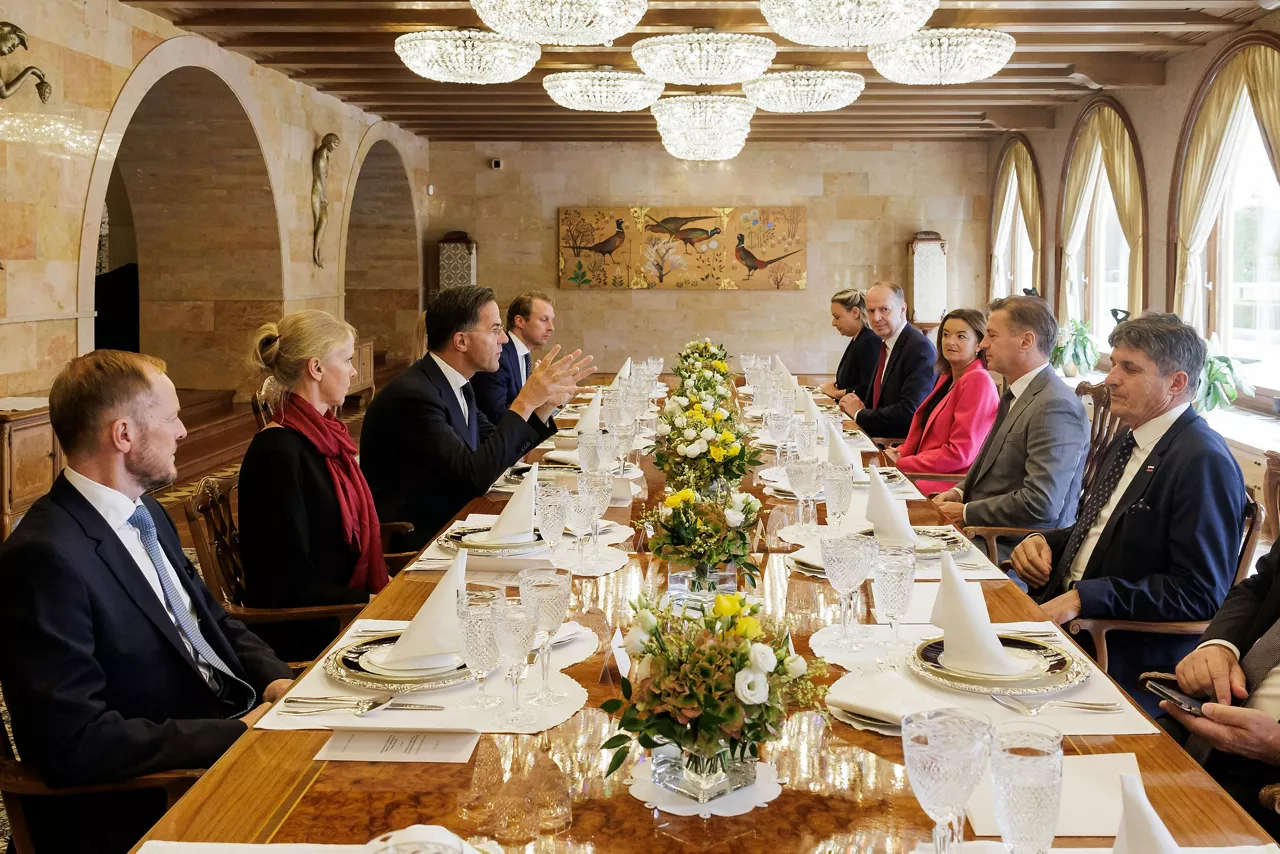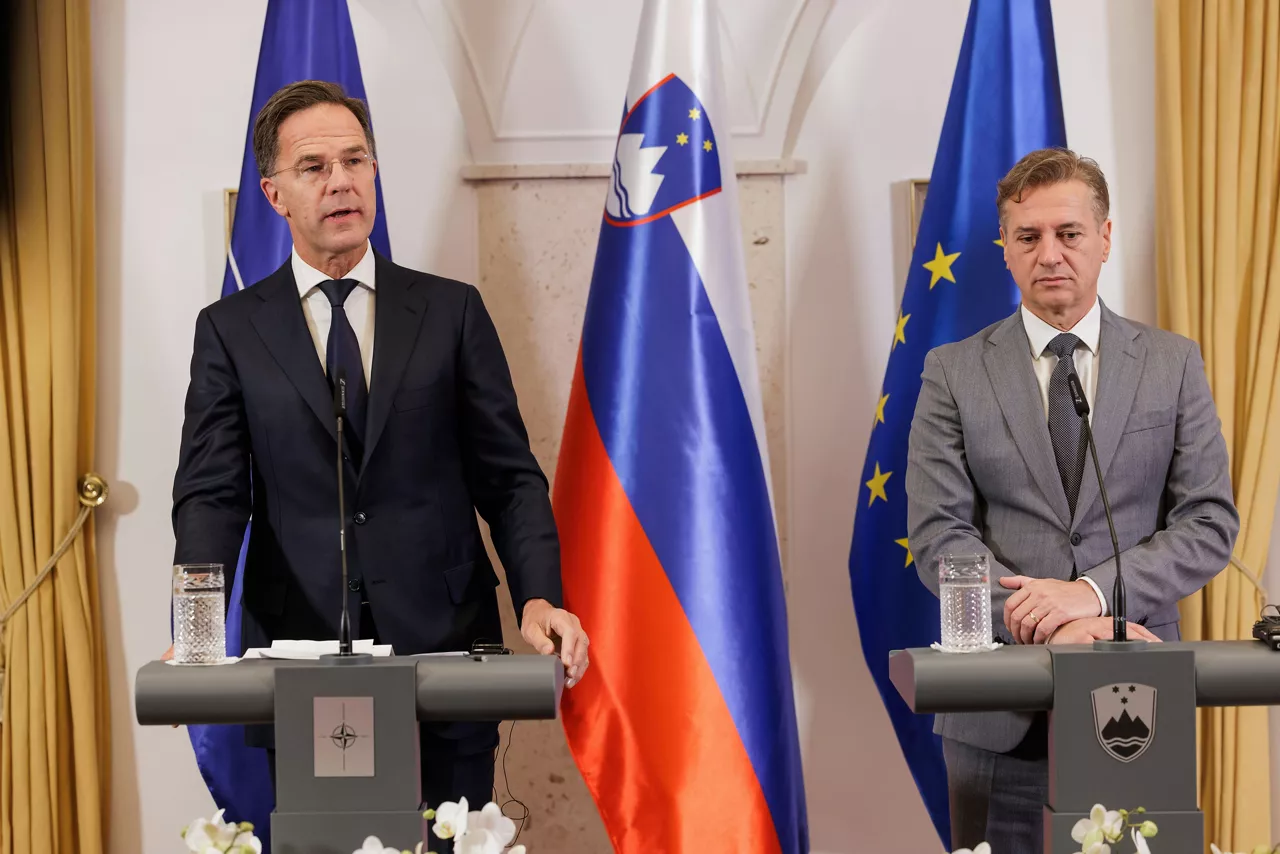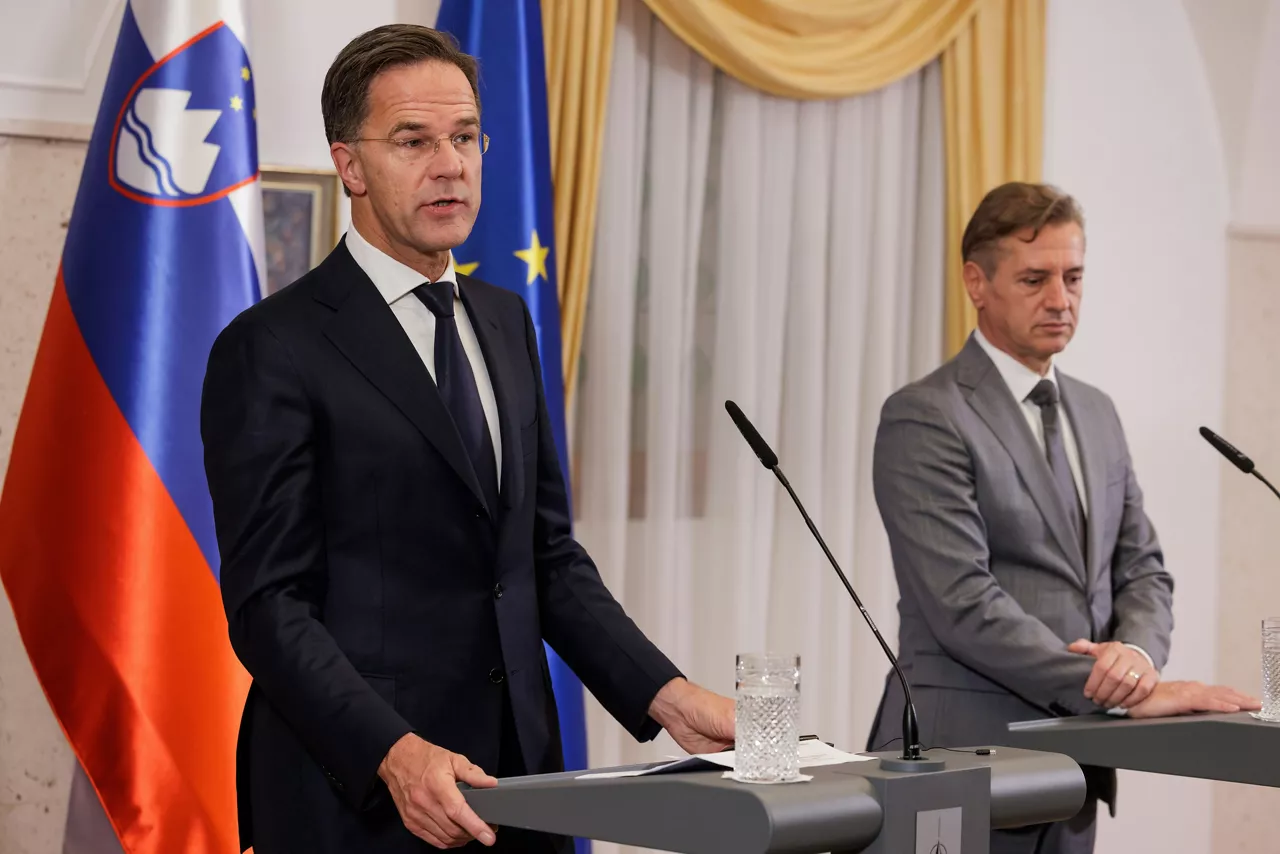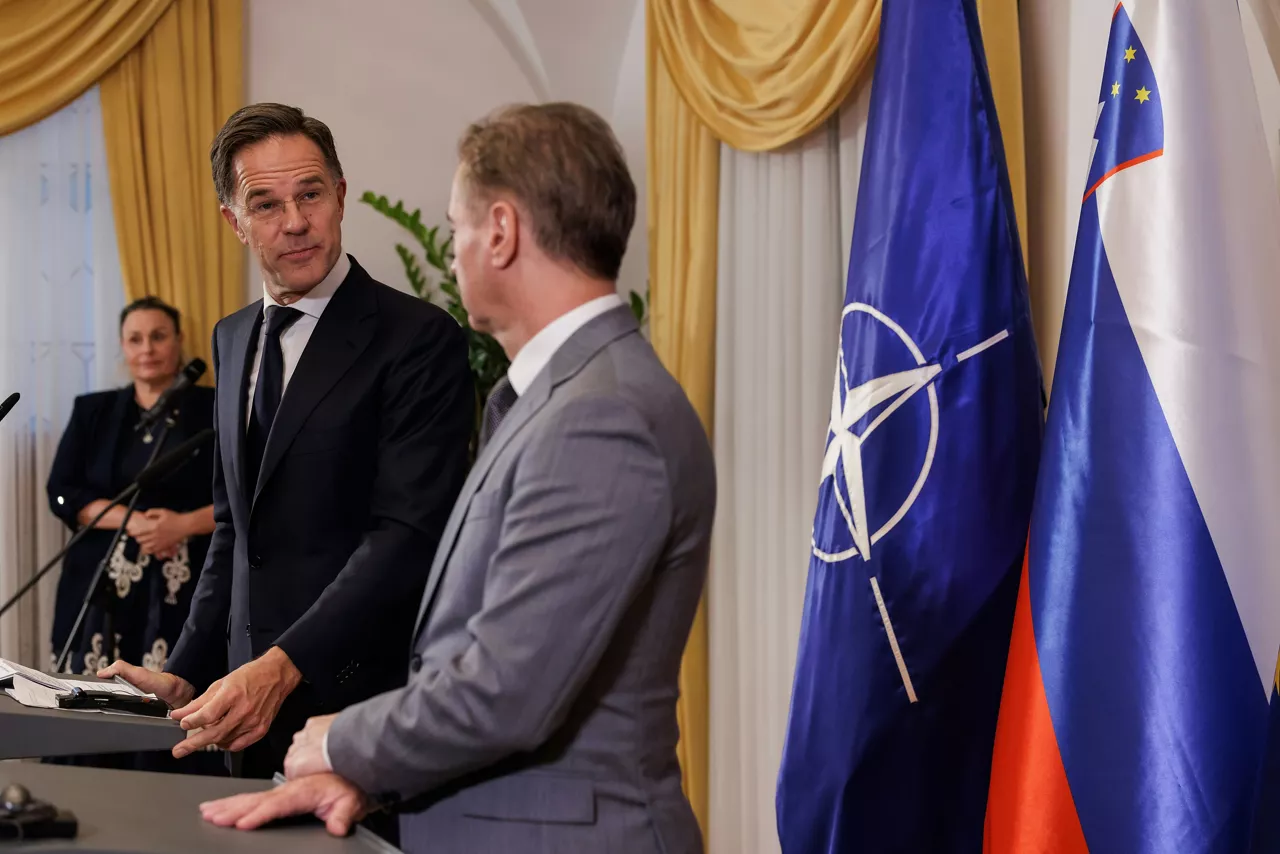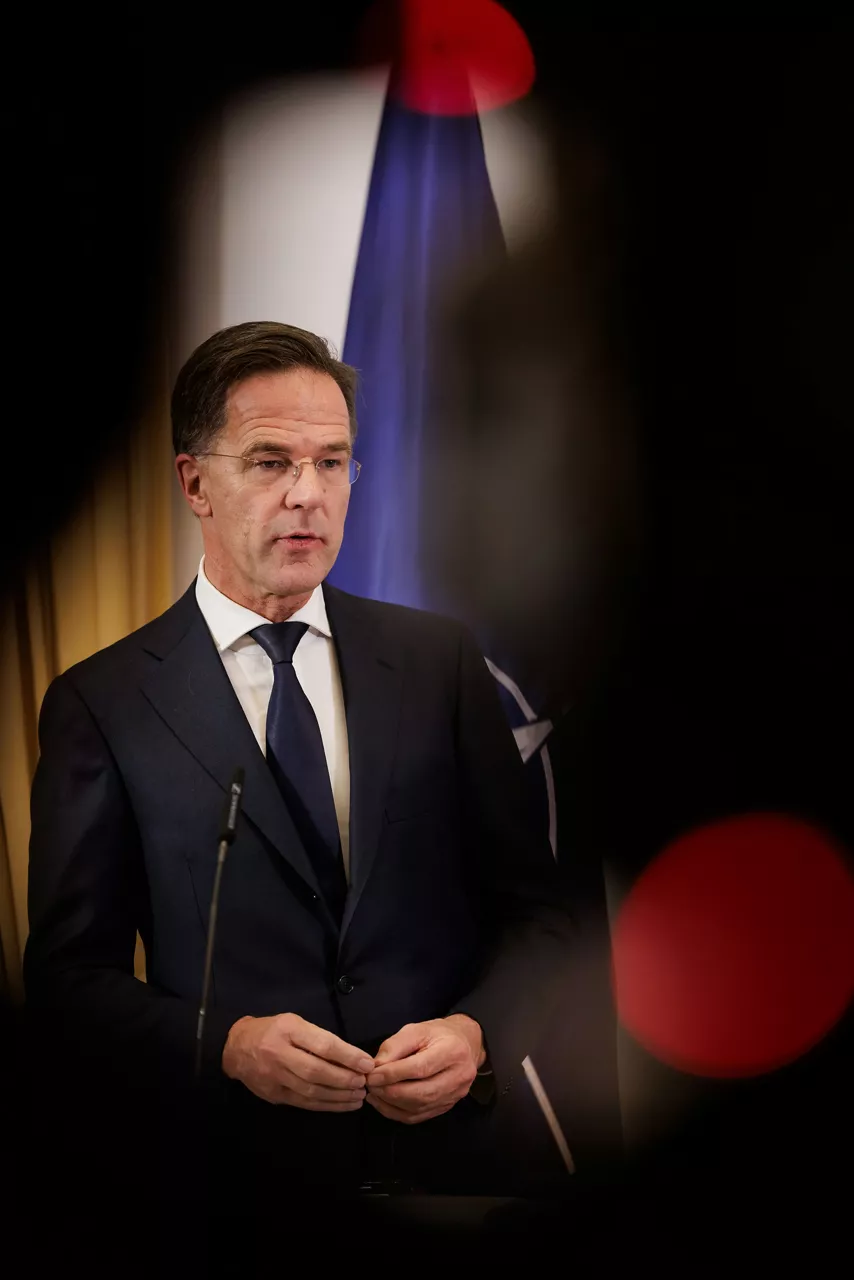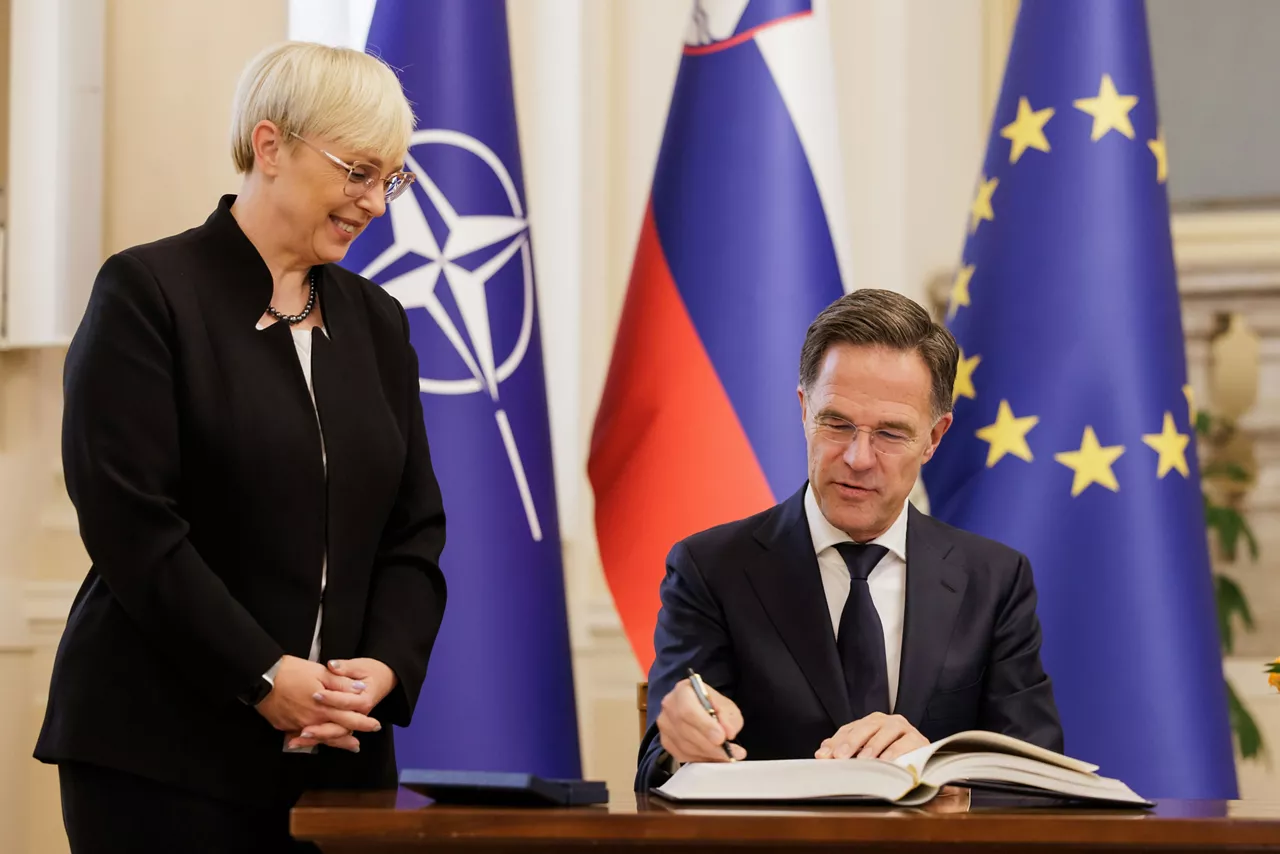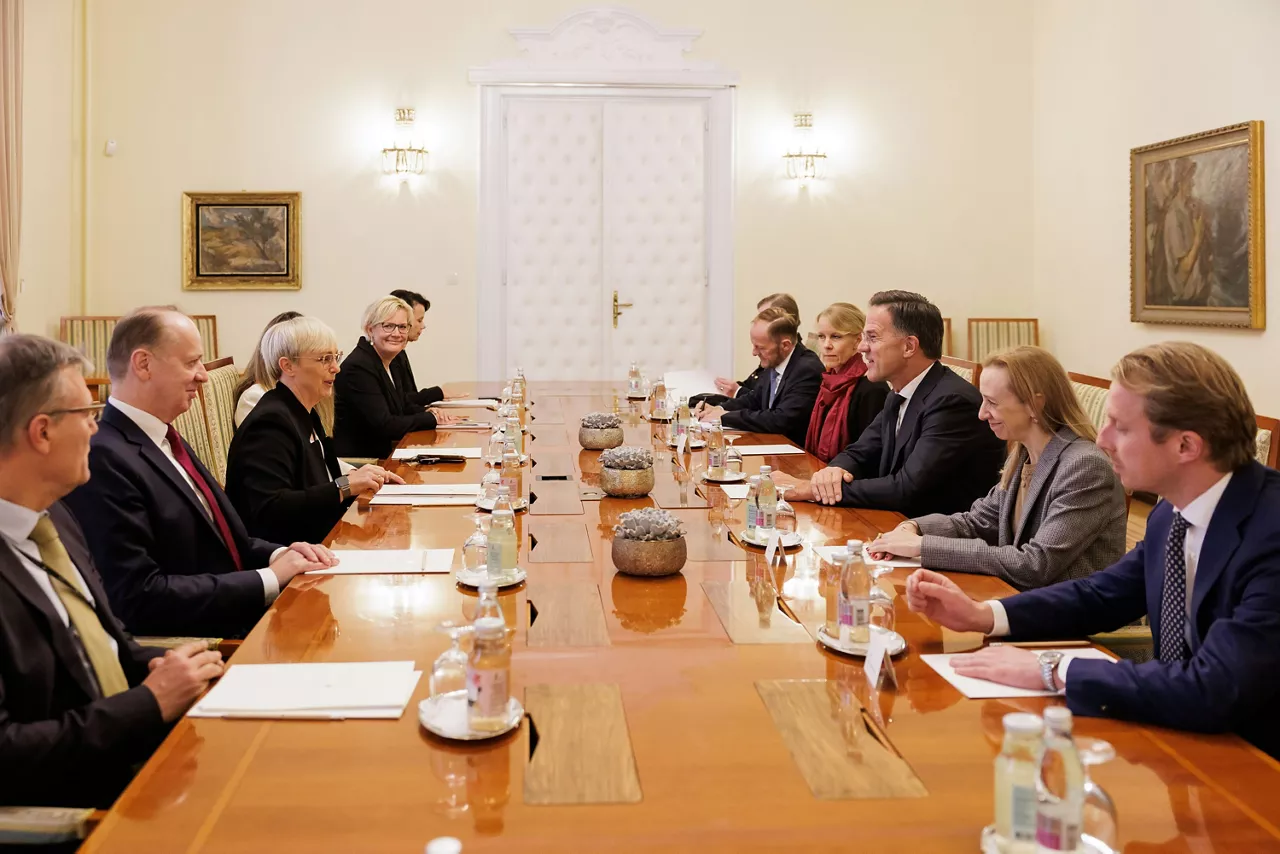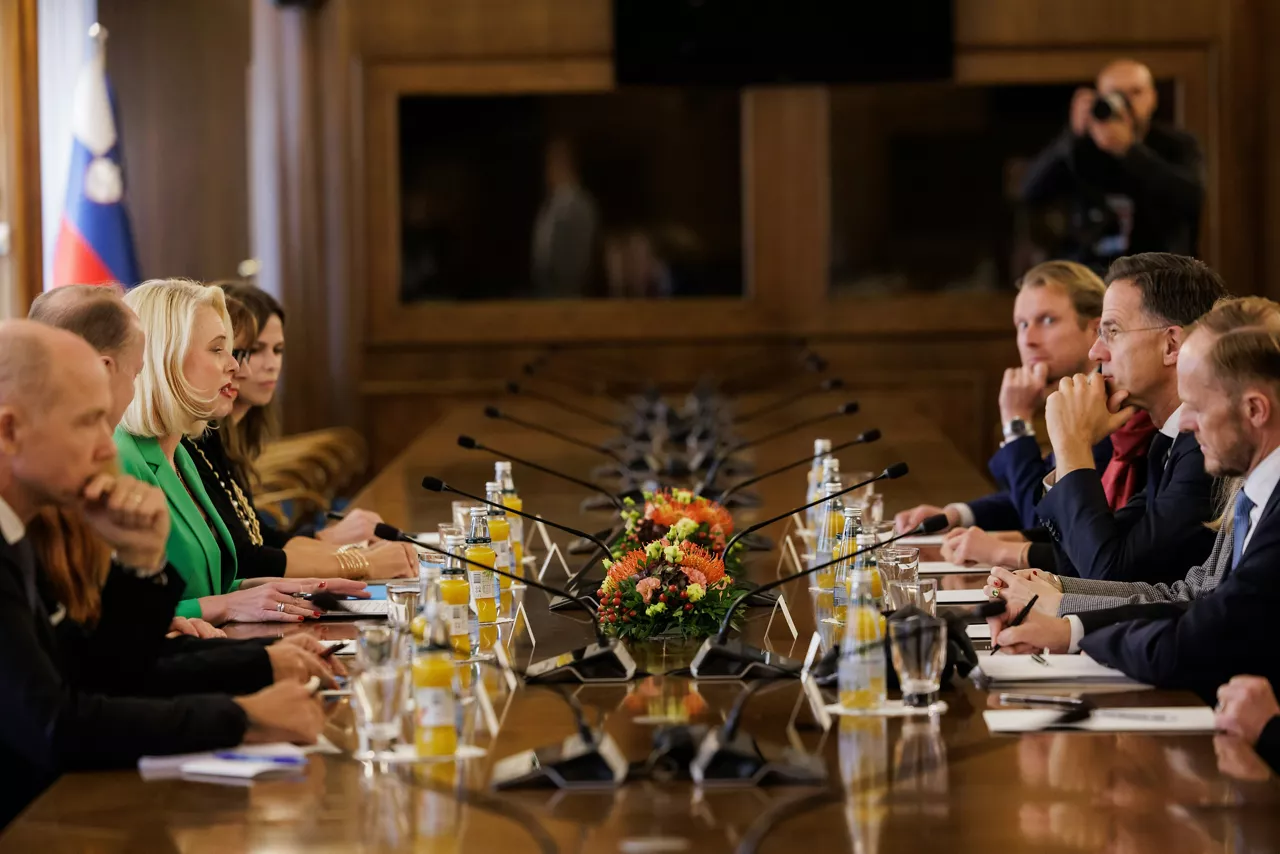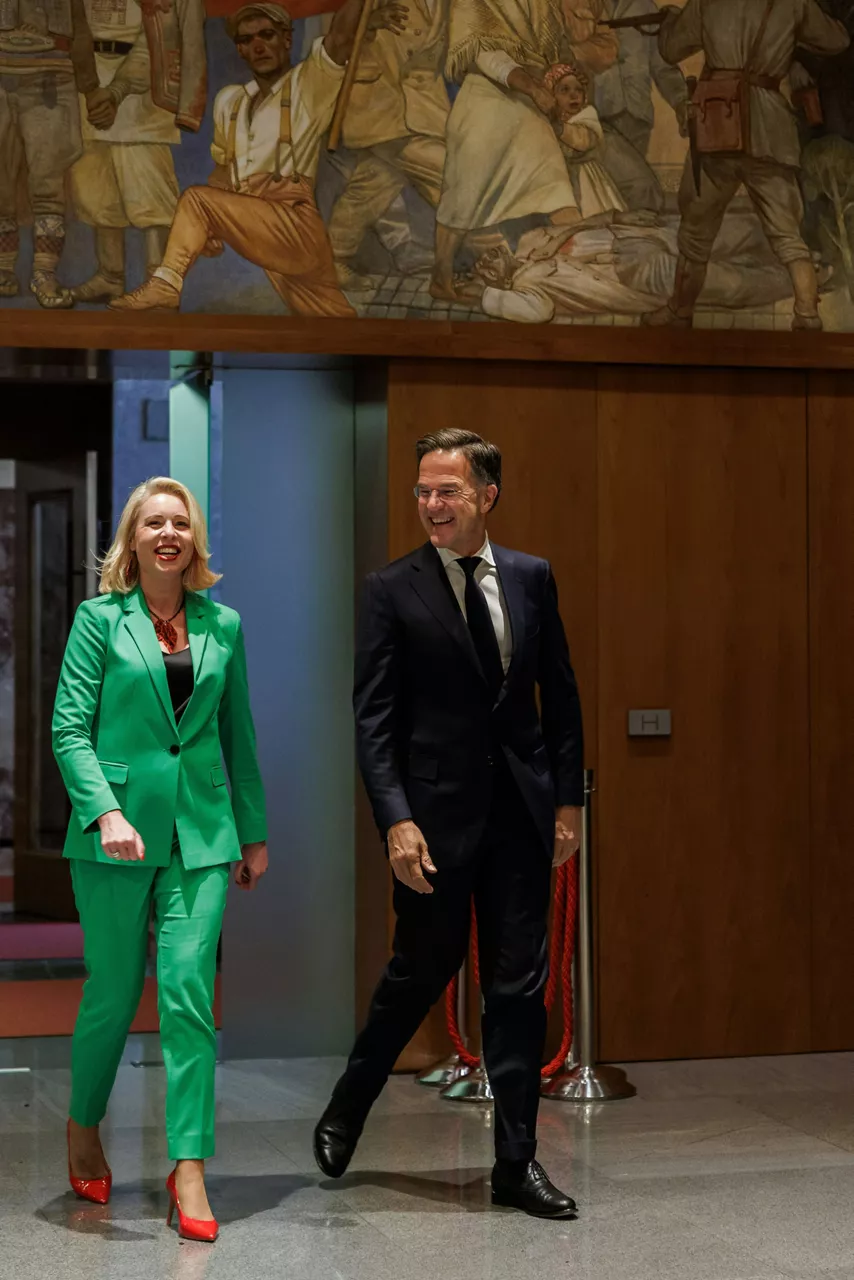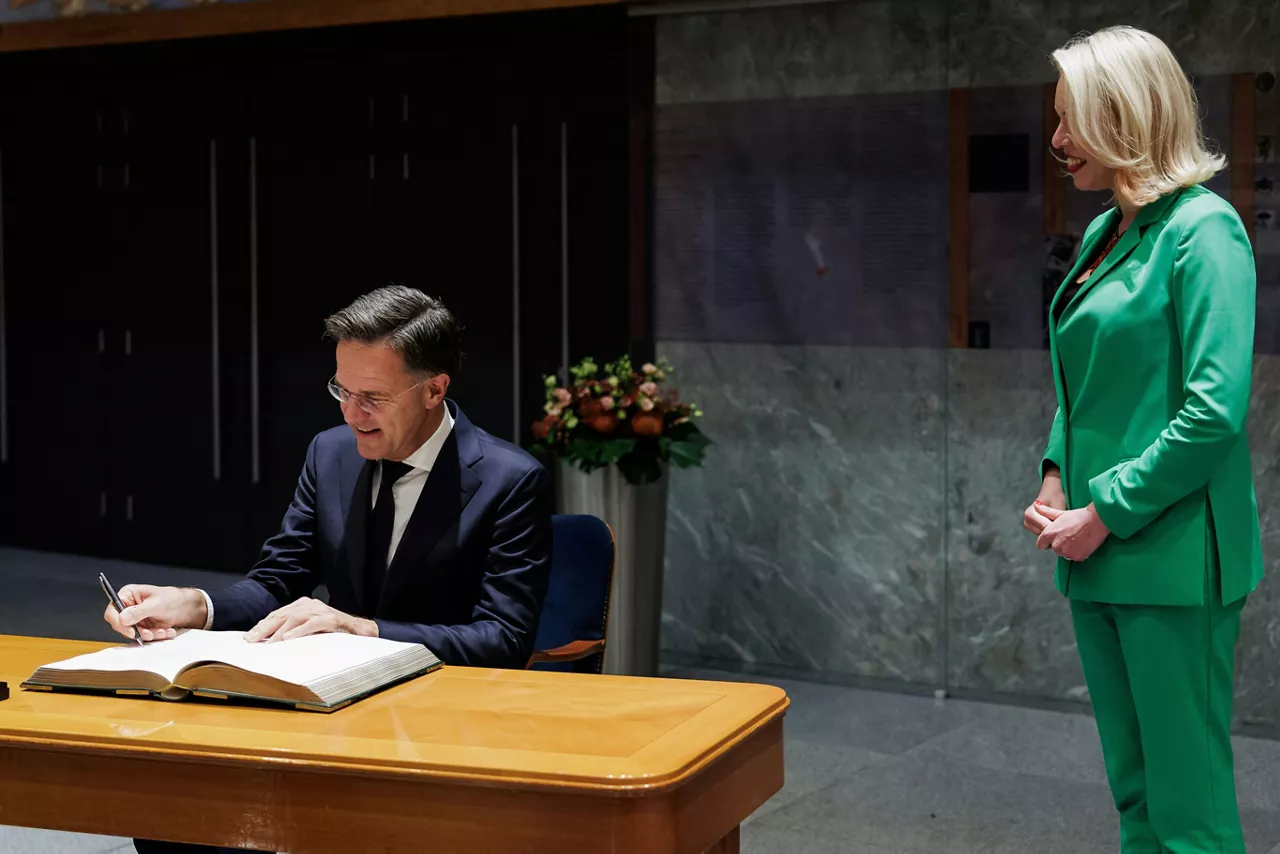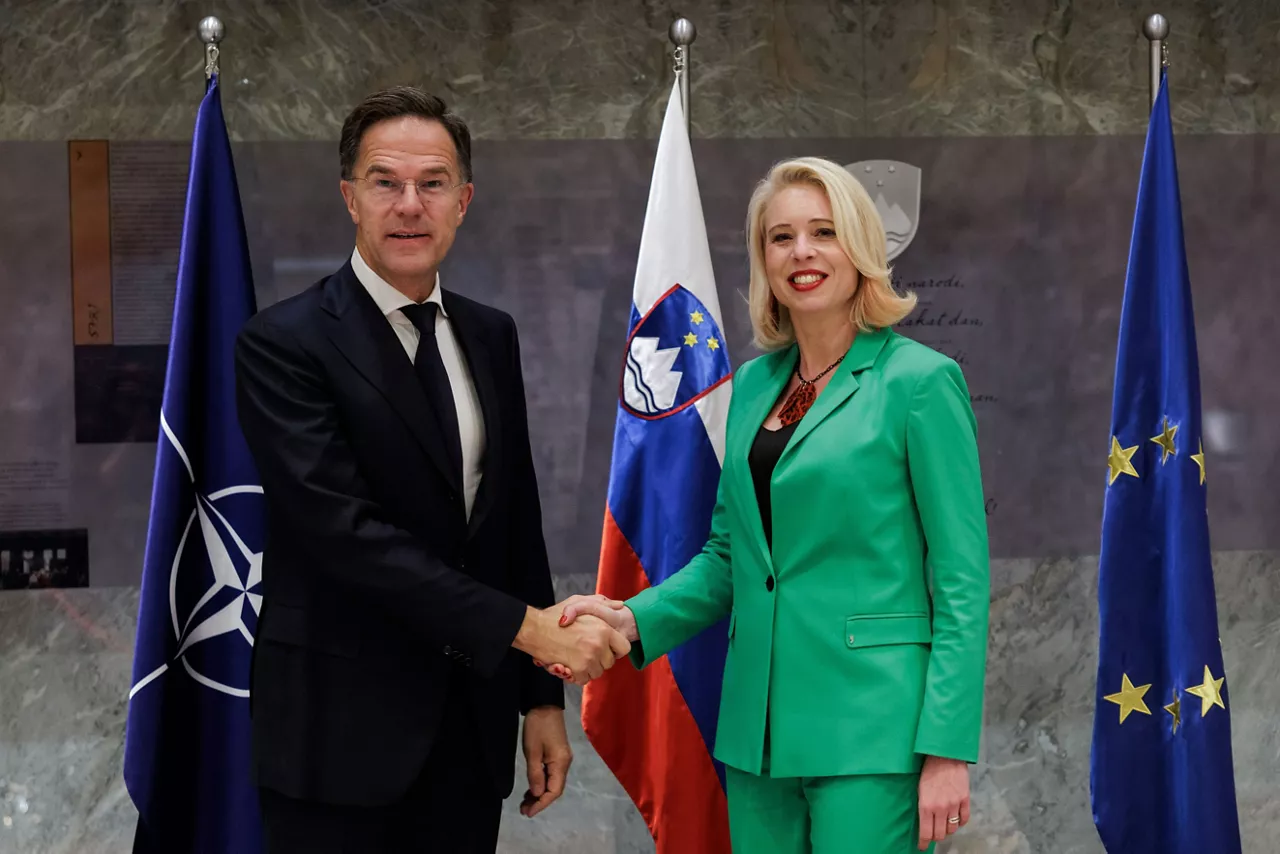Download NATO’s broadcast-quality video content free of charge

Log in
NATO MULTIMEDIA ACCOUNT
Access NATO’s broadcast-quality video content free of charge

Check your inbox and enter verification code
You have successfully created your account
From now on you can download videos from our website
Subscribe to our newsletter
If you would also like to subscribe to the newsletter and receive our latest updates, click on the button below.
Enter the email address you registered with and we will send you a code to reset your password.
Didn't receive a code? Send new Code
The password must be at least 12 characters long, no spaces, include upper/lowercase letters, numbers and symbols.
Your password has been updated
Click the button to return to the page you were on and log in with your new password.
(As delivered)
Dear Marcos, Mr. President.
And let me start by saying that today, I believe, is a good day for peace and stability.
As we know, President Trump, he arrived in Israel to mark the ceasefire between Israel and Hamas and the release this morning of hostages.
So I believe this is great news, and we all want to see peace and security in the Middle East.
And therefore, of course, we also hope that this will repeat itself in Europe as soon as possible, because we still have a lot of work to do in Europe, but we can build on this success, I'm absolutely confident.
First, I also want to pay tribute to Lord Campbell, who served with distinction in the NATO Parliamentary Assembly for over three decades. Ming, as he was known, was a great champion of NATO and the transatlantic bond.
He leaves an outstanding legacy and will be remembered fondly.
It is a pleasure to be here in Ljubljana with you for our first discussion since the NATO Summit in The Hague.
We took historic decisions to make NATO stronger, fairer and more lethal, as Russia, China, North Korea and Iran work together to try to reshape the global order.
Russia now allocates 40% of its budget to its war economy, and this year alone, it is expected to roll out at least 1500 tanks, 3000 armoured vehicles and hundreds of Iskander missiles.
China too is rapidly expanding its military capabilities, including its nuclear arsenal.
NATO is stepping up.
Allies are committed to investing 5% of GDP on defence, both for core defence spending as well as defence and security related investments.
European Allies and Canada are now on a trajectory to equalise their defence investment with the United States.
When everyone contributes their fair share, we are all more secure.
At The Hague, we committed to rapidly expand defence production across the Alliance so that our armed forces have the capabilities they need to keep our deterrence and defence strong today and in the future.
At the Summit, we also reaffirmed NATO’s enduring support for Ukraine so that it can defend itself against Russia today, be in a strong position for any peace negotiations and be able to deter any Russian aggression in the future.
And since the Summit, NATO has launched a new initiative to support Ukraine, the Prioritised Ukraine Requirement List, or PURL, and this is supplying essential, lethal and non-lethal military equipment that only the US can provide to Ukraine, paid for by Allies.
2 billion dollars of equipment so far has moved in this way.
It is not only keeping Ukraine in the fight, it is saving lives, and this is just in the first two months of PURL.
More will follow soon, and we must keep up the tempo.
And I know that also, President Zelenskyy, this morning addressed PURL in his address to this audience.
On increased defence investment, production and support for Ukraine, I count on all of you as parliamentarians to make the case with your publics and to encourage your governments to keep up with their commitments.
You all play a vital role to keep NATO's 1 billion people safe, and I want to thank you for everything you are doing on this.
Because we live in a dangerous world, and the threat is not something that's held at a distance.
The risks to our security have reach, the new generation of Russian missiles can reach European capitals in a matter of minutes.
The disruptive power of drones, sabotage of undersea infrastructure, the security of cyberspace.
All of us are affected, east and west alike, and with these challenges to our security, we see yet again why it is so essential that we work together in NATO.
When it comes to Russia's reckless and dangerous violations of our airspace, we have seen that NATO's response was quick and effective.
We are doing what we trained for, and it works, but we need to do more, and that's why within 36 hours after Russian drones entered Polish airspace last month, we launched Eastern Sentry, with more forces in the air, on land and at sea.
It gives NATO additional strength and flexibility across the eastern flank or wherever needed, whenever needed, and it will incorporate innovative technologies and tactics designed to deal with new challenges, like, for example, drones.
NATO Defence Ministers are meeting this week and will engage on how best to further strengthen our deterrence and defence posture, including in light of recent incidents.
They will discuss plans for reaching the new defence investment target, as well as efforts to increase defence production.
And all of this helps to ensure that we remain ready and able to defend our citizens.
We should not underestimate the threat from Russia, but we should not overestimate Russia's capabilities either.
Despite their posturing, they’ve failed to meet their ambitions, and at an incredible cost, more than 1 million Russians killed or seriously injured.
In 2022, Russia thought it could crush Ukraine within days.
In the fourth year of its brutal war, Russia is struggling to advance.
Russia's military is stretched there and elsewhere.
Its Mediterranean task force was once a mix of surface ships, submarines and support vessels.
Now, in effect, there is hardly any Russian naval presence in the Mediterranean left.
There is a lone and broken Russian submarine limping home from patrol.
What a change from the 1984 Tom Clancy novel ‘The Hunt for Red October.’
Today, it seems more like the hunt for the nearest mechanic.
But while Russia is not as strong as it would pretend, it remains deeply dangerous, and that is why it is absolutely essential that we ensure we are prepared.
Russia conducts a covert campaign against our societies and attempts to undermine our support for Ukraine.
Russia's list of targets for sabotage is not limited to critical infrastructure, the defence industry and military facilities.
It even includes public spaces.
15 people were charged last month after devices hidden in parcels were detonated across Europe last year.
Russia also continues to carry out cyber and espionage operations against our countries.
This summer, the United Kingdom exposed the use of sophisticated spying software by Russian military intelligence.
The home front and the front line are now one and the same, and this is why, as part of The Hague Defence Investment Plan, we will invest more to protect critical infrastructure, defend our network, strengthen our resilience and enhance civil preparedness.
As parliamentarians, you have an important role in raising awareness about the need for civil preparedness.
The more our citizens know now, the more able we are to face any threat.
Our militaries and societies are in this together, let us continue to stand strong together in NATO to keep our 1 billion people safe.
Thank you and I look forward to our conversation.
NATO Parliamentary Assembly President Marcos Perestrello
Thank you, Mr. Secretary General, we now come to questions. I will follow our usual procedure. I will announce those called to ask questions in groups of three. I will set one-minute time limits for questions; I encourage you to keep your questions as short as possible so that more delegates can participate. Given that some 40 members have indicated that they would like to ask the Secretary General a question, it is highly unlikely that we will be able to go through all the questions. As usually, I will prioritise first Vice-Presidents of the Assembly. Secondly, Heads of members Delegation, and thirdly, acting Heads of Delegation while exercising my discretion in calling members, which will be used exactly now when I give the floor to Slovenia to Janez Zakelj, please, you have the floor.
Janez Zakelj, Head of the Delegation of Slovenia
Thank you very much. Mr. Secretary General, as you mentioned in your speech, The Hague Summit’s 5% GDP target, with 3.5 dedicated to hard defence, represents a historic increase in Allied defence spending. But the debate is shifting from how much to how well. Many capitals are concerned that such large sums risk being dispersed across national wish lists rather than delivering real collective defence capabilities. How will NATO ensure that the 3.5% mark for hard defence is directed toward joint priorities such as air missile defence, long-range strike munition stockpiles and defence industrial scaling instead of duplicative or politically-driven purchases? And what is your view on NATO setting binding capability targets or common procurement mechanisms in order to turn this money into interoperability and deterrence, not inefficiency?
NATO Parliamentary Assembly President Marcos Perestrello
Thank you Janez. And now, Fernando Guiterrez, Vice-President from Spain. And then Mikko Savola from Finland.
Fernando Gutierrez, Acting Head of the Delegation of Spain
Thank you so much Mr. President, Mr. Secretary General, we understand and clearly assume that Russia, China, Iran and North Korea are linked and committed in the support to Russian aggression to Ukraine in many ways: they provide support to Russian invasion, from the strategic to the tactical level, providing political endorsement, logistical support and even military assets, such as massive drones resources or military units and soldiers, as it is the case for North Korea. What appears clear in the battlefield and brings us to make efforts in purely military capabilities, such as air defence or long-range artillery resources, does not seem to be to be so clear in hybrid warfare. Their disinformation campaigns and their influence campaigns serve common purposes which are to weakening our democratic life standards. However, our commercial links and even dependency from Chinese resources and supplies in communications make our policies to be weaker on this matter. Are we focused enough on the common challenge all of them represent as hybrid threats, and are we putting together enough preparedness for it? Thank you so much, Mr. Secretary General.
NATO Parliamentary Assembly President Marcos Perestrello
Mikko Savola, Vice-President from Finland.
Mikko Savola, Member of the Delegation of Finland
Mr. Secretary General - thank you for your speech and engaging with us today, as NATO works through parliamentarians, our dialogue is of great importance, so, thank you for that. I would like to express my gratitude for your support regarding the incident last year in the Gulf of Finland, where the vessel operated by the Chinese interest was caught damaging cables and the pipelines between Estonia and Finland. I'm afraid that this type of threat is likely to become more common across the NATO territory. The countries on the Eastern Flank are particularly exposed. But as demonstrated by the actions of the Finnish Border Guard, it is possible to act and arrest the aggressive actors and bring them to the court. We have now seen that the interpretations of international law are not always a clear cut, yet the Russian sabotage, sometimes facilitated by China, must be stopped. But in your opinion, should NATO act more decisively to prevent such a sabotage in the Baltic Sea along the North and Eastern Flank? And what with means to ensure that those actors who are responsible are held accountable? Should we reevaluate our peacetime rules of engagement and be more robust in our actions, as has been discussed also here during this week-end? Thank you.
NATO Secretary General Mark Rutte
Thank you so much, so let me take them one by one and start with Janez Zakelj, of Slovenia. Your question is crucial because, and extremely important. Because, if we are going to spend 5% on defence and 3.5 on core defence, and it is not on the stuff we need, we will lose our populations. The good news is we will not do that. And this is the difference between 2014 and The Hague Summit. In 2014 the great thing in Wales achieved was the 2%, but was a bit a 2% plucked from the air. Now, the 3% (3.5%) core defence spending is rooted, deeply rooted in NATO’s defence spending process from which we agreed on the capability targets. And when we agreed on the capability targets, we knew that the ballpark figure to get there would be between 3.4, 3.5, 3.6% (by) latest 2034, 2035. And this is exactly what we decided: 3.5, 2035, and with a credible path to get there. So not staying where we are and then in the last year, we move from wherever we are to 3.5. No – a credible path for each nation, for each Ally, to get there. And some of us are already there, even doing more than 3.5, like Estonia and Poland, but also increasingly, Latvia and Lithuania, but most of us still need to get there. So, it is deeply rooted and exactly on the issues you mentioned, like long-range strikes, large manoeuvrable land formations, logistics, of course, ammunition, all these, we always said this is secret what we need to do, but we can tell you so much, this will be part of it, plus air defence, and we know we have to almost quadruple even do times 400% which means five times more in terms of air defence systems than we have now. We know they are quite expensive. And at the same time, we have to make sure that we incorporate in everything we are doing the latest technologies. So, for example, what we have seen with Poland, we need to step up even further when it comes to anti-drone technology. So, we will do that. But this whole NATO planning process leaves that room, to make sure you constantly keep figuring in every year, every available discussion, the latest technologies. And this is how we have to - so please also help here that when your population is saying, ‘Hey, are we doing the 3.5 as part of the 5%, so the core defence planning, to equalise with the US?’ That is a very much nice to have, because the US, rightly, is extremely irritated with the fact that they spend more than Canada and Europeans were spending on average. That is very, very much nice to have. But the reason we do it first of all is to defend NATO territory, and therefore we need the 3,5% to keep the Atlantic, the Arctic and Europe safe, and therefore also the United States.
When it comes to production, it’s not only spending, of course, on men and women in uniforms, also on production, and it’s about developing our defence industrial base, which is part of 1.5% defence-related spending, but of course, also being able to spend the money on the defence industrial output. And then we need the defence industrial output. And by the way, this is a problem across the Atlantic, not only in Europe and Canada, also in the US, that our defence industrial base is, at this moment, still not producing enough. The good news is, when it comes to ammunition, we are turning the corner. We are really making progress on ammunition. We are much better - 155, and other types of ammunition - than we were only a year ago. And take the United Kingdom. You guys are building six ammunition factories in the United Kingdom, and many other ammunition factories are now coming online. I was in Unterlüß, in Germany, where a factory was built from nothing - there was nothing, there was only a green field, and in 14 months, this factory was commissioned, now I think, six weeks ago. And that is in Germany, which, like the Netherlands and other countries in Europe, is famous for all its procedures and difficult that you need years to get the agreements. But they were able to do this because of the urgency of now.
So, really explain to your people, ‘please, yes, we need to spend 3.5, yes, we need to equalise with the US, yes, that’s crucial to keep the US in NATO, because they are totally committed to NATO, but they also expect us to spend the same as they do.’ But the deep-rooted core of why we need to spend the 3.5 is in the capability targets which are coming forward from the NATO defence planning process. And that’s what we need, when Article 5 would ever be triggered, what we collectively need to do to be able to fight against any adversary, be it the Russians or anyone else.
On Spain, I completely agree with you, Sir, that this is one of the worrying factors that the Russians are working there, together with Iran and China, and of course, North Korea. And these countries are getting a lot of stuff in return for their support. It is not that North Korea is doing this just because they are bosom buddies, Kim Jong Un and Vladimir Putin. No, they get a lot in return. For example, missile technology, which is increasingly also posing a threat to the US mainland. China is getting a lot in return. Take cheap oil and gas and whatever they're getting. And of course, Iran is getting a lot of money, which they use to prop up their proxies in the Middle East, to stir conflict in the Middle East. So, this comes at a high price, and it also means that the Indo-Pacific and the Euro-Atlantic are not separate theatres. They are completely combined. I'm not pleading, not pleading to extend Article 5 to the Indo-Pacific. But I am pleading - and I was this morning on the phone with the Australian Defence Minister, and last week with the Japanese Prime Minister - there is a close cooperation, for good reasons, between NATO and the Indo-Pacific countries, Japan and Republic of Korea and Australia, and New Zealand. And they want that cooperation on defence production, innovation, on wherever we can try to exercise together, whatever we are doing together, without extending Article 5 to the Indo-Pacific, because they see, for them, of course, the direct build up in China massively of their military forces. But also, the fact that when it comes to the Indo-Pacific and the Euro-Atlantic, you cannot distinguish the two theatres. We really have to look at them as one, because if, for example, China would move against Taiwan, it’s highly likely that China will force the junior partner in that relationship, being Russia, under the leadership of Vladimir Vladimirovich Putin to move against NATO here, to keep us busy. For all these reasons, we have to make sure that we work as strongly together with them (the Indo-Pacific partners).
And then on the hybrid threats. This is, of course, a big worry, and we are working on it, I think. And then I also link it to the question of Finland, Mikko Savola. And thank you again, Fernando Gutierrez for your question. I think, when it comes to, for example, the cutting of undersea infrastructure and this cable on 25th of December, 2024 - the Christmas Day – they cut that sea cable, I was on the phone immediately with all the relevant players. And then SACEUR, the Supreme Allied Commander Europe, Chris Cavoli, launched Baltic Sentry. In 10 days, it came online, on the 5th of January. And this is basically an end - this is a reaction to the hybrid threat, a direct NATO reaction to the hybrid threat of cutting our crucial undersea infrastructure. And it’s very successful. The Russians hate it.
And now we have to do the next thing, because when it comes to the Shadow Fleet, and this was another point I think you also mentioned. You probably have heard last week the French President Emmanuel Macron, in, during the European Political Community meeting in Copenhagen, saying ‘this should be a new priority for us in Europe and in NATO working together on doing whatever we can do to cut off that crucial supply of money to the Russians’. Of course, we have all the international law, the law of the sea and UNCLOS, etc, but there’s a lot we can do to make it difficult. And this whole Baltic Sentry in itself already is posing a cost on Russia, because they have to protect these Shadow Fleet ships more than they did in the past. They have to think about it. It is adding a logistical layer which they are not able really to command, so it’s really hurting them, and this is exactly how we have to react to these hybrid threats.
NATO Parliamentary Assembly President Marcos Perestrello
Thank you. We have another set of three questions, Vice-President Vadai from Hungary, Vice-President Dzerowicz from Canada, and the Head of the Polish Delegation, Joanna Rostkowska. Agnes Vadai, please, you have the floor.
Agnes Vadai, Member of the Delegation of Hungary
Thank you so much Mr. President and Mr. Secretary General. Women in conflict and in non-conflicts are constant targets. In conflict, their dignity and their body is attacked. We unfortunately have seen that in during the Russian aggression against Ukraine. What kind of programmes NATO is planning to introduce to increase women's participation in shaping NATO’s policy at all levels, and to strengthen the position and the visibility of the Secretary General’s Special Representative for women, peace and security? Thank you so much.
NATO Parliamentary Assembly President Marcos Perestrello
Thank you, Agnes. Julie Dzerowicz from Canada.
Julie Dzerowicz, Head of the Delegation of Canada
Hello, Mr. Secretary General, thank you so much for being here. It means a lot to all of us. Secretary General, as you know, Canada has been a founding NATO member and a strong champion of collective defence. Our Prime Minister Mark Carney has accelerated our commitment to meet the 2% spending target by the end of this fiscal year, and we're firmly committed to reaching 5% of GDP by 2035. Now, NATO’s Article 5 has been the cornerstone of the Alliance for more than 75 years. In the context of hybrid warfare, cyber warfare, threats to critical infrastructure, violations of the airspace of NATO members, all things that have been mentioned this morning, how has NATO’s thinking evolved around what the threshold is to trigger an Article 5 response? So, another way of saying this, at what point does the cumulative weight of these hybrid attacks constitute the armed attack that Article 5 was designed to address? Is there a new red line that we need to communicate to deter these new types of aggression and ensure our collective defence? Thank you.
NATO Parliamentary Assembly President Marcos Perestrello
Thank you, Julie. Joanna Rostkowska.
Joanna Rostkowska-Kluzik, Head of the Delegation of Poland
Mr Mark Rutte, thank you very much. First time I want to talk – I want to thank for our Dutch, Italian and German Allies, for united defence of Polish skies after the Russian attack last month. Thank you very much. Fortunately, we won this situation demonstrating that we can fight together. I have no doubt that Russia will punish Europe for supporting Ukraine and will increase the cost of the support. Accidents over Poland, Estonia, problems of European airports show that Russia is already fighting with Europe. I have three short questions. What will be NATO’s response to the situations? What strategic dilemmas, both military and not military, we can create for Russia? And how to ensure synergy between NATO and European Union defence initiatives? Thank you very much.
NATO Secretary General
Agnes Vadai, thank you so much for that question. Let me first say that the Special Representative for Women, Peace and Security is doing outstanding work, and we all can be very glad that she’s doing it. And this is also about making sure that we recruit and we retain women in the military, that we do understand that therefore sometimes you have to make adjustments to how we work together, how we train together, and to make use of the full - I was in Norway the other day, I was really impressed when I spoke with Jonas Støre, the Prime Minister, that 1/3 - if I’m correct, the Norwegians can correct me here if I’m bit over enthusiastic here - but that 1/3 of the Norwegian armed forces, at least, the new recruits, are women, and I think it is now even 1/3 of the whole Norwegian military. So that’s rapidly developing, rapidly changing, and this is what we need. I mean, we need a whole-of-society, but we also need everybody in society, all the talents to join the military. And when it comes to our core task, deterrence and defence, let’s not underestimate the role women play there, and how we have to make sure that that we also, therefore, when it comes to WPS, we integrate that and embed that within all our core policy making. That’s also how we have now organised it in the NATO Headquarters, really embedded it with our core political and security division, so that it is really part of - not as a separate office, but really as part of the of the policy making system, so that there is a seamless integration of their important work, of this team, across NATO. There’s always the risk that you appoint somebody with a special task, somewhat separate from the organisation, and then she or he is responsible for that separate task, and the rest doesn’t have to think about it any longer. The great thing now is that it is integrated in policy making. So again, it is the Special Representative for Women, Peace and Security, driving this and accelerating it and being the champion, but also mainstreaming it in the whole of NATO policy making. This was one of the changes we made in the structure over last summer. So, thank you, and I can assure you, I will keep on championing this.
Then on the second question by Julie Dzerowicz from Canada, thank you for that question. I mean, let’s not make the Russians or any other adversary too knowledgeable about Article 5. We always have maintained a certain pleasant, let’s say, unclarity to the outside world when Article 5 is triggered, and that ambiguity is exactly part of how we deter and defend, but I can assure you that when it comes to cyber, when it comes to hybrid, of course, we have to incorporate it in our thinking. This is exactly what we are doing. But also, let’s - we are allowed to – a lot happened during the last couple of weeks, we have seen the drones. And this is also to the Polish question, the drones now three, four weeks ago, into Polish airspace. We have seen the three MiG-31 entering Estonian airspace. We have seen, of course, what happened around - in the run up to – by, Denmark hosted the special EU Council - extraordinary EU Council - and then European Political Community meeting only two weeks ago now. And we know that it was Russian drones and Russian MiG-31s in Poland and Estonia. We don’t know whether it was intentional or not, but we do know they were Russian. And we do know, whether they were intentional or not, it was totally reckless and unacceptable. With the drones in in Denmark, it’s famously difficult to assess where these things come from, but they were not coming from the Danish Government, I can assure you. And I was really proud how nine countries in NATO came together, working together with the Supreme Allied Commander, with NATO supporting that effort, and nine Allies coming together to make sure that Denmark was well-protected when these two important meetings took place. But we can also take some comfort from how we acted. The Dutch F-35 shooting down drones over Polish airspace. Italian F-35 pilots escorting these MiG-31s out of Estonian airspace. I often get the question, ‘do our authorities have all the authority they need to deal, for example, with when MiG-31s, or other Russian objects, fly into NATO airspace?’ I can assure you – they have. They have trained for this. They have prepared for this. This is not new. We do this since the 1960s,1970s, since the Soviet days. And when these planes would pose a threat, we can do the ultimate. As long as they don’t pose a threat, we will gently guide them out of our airspace and make sure they understand they should better not do this again. And I think this is exactly how we should react, and it’s exactly what the Italians did in the Estonian case. And I think that was very wise. And of course, we have to make sure that also the Russians know that we know that they know that we know. But then, of course, the question is, is it intentional? That is always famously difficult to assess and really, with you - and this is also to the point that Joanna made - I really want to thank in your case, the Italians, the Germans, the Dutch when it comes to the MiG-31s in Estonian airspace, it was again Italy together - I think it was with Sweden and Finland - who were helping there. So, this is - and the Russians know this. And we also know that their MiG-31 pilots are famously not well trained, all part of the fact that their military are not in the best shape.
And then your last question that has to do with NATO-EU, I can assure you, from day one I came into office, (I’m) very good friends with Ursula von der Leyen. We had lunch in my third week in October. I visited her, and we agreed that we would work together. And as I said before, we agreed that we will always agree, and if one day we would not agree, we will then sit together or call each other and only hang up when we agree. And even a bathroom stop is not allowed. So far that was not necessary because we always agreed, because we have a clear understanding of the division of labour. The EU is famously good at bringing together the internal market, the whole soft power of the European Union when it comes to regulation, when it comes to, for example, helping to develop the defence industrial base. And NATO has its strengths in the capability targets, in the standard setting. For example, it comes to the anti-drone technologies, this is exactly an area where we work together, where NATO also learning from Ukraine and learning from what our Allied Command Transformation is doing - Admiral Pierre Vandier and his team - we are learning from all of that, making sure that we have the latest technologies. But then we need the EU to bring together the money and the defence industrial base and everything we need to collectively do this. And so, there is no mission creep on either side. We really do this in conjunction, and that makes us so strong. And of course, for those not in the EU, and only 23 of the 32 Allies are in the EU, nine are not, I can assure you, Ursula von der Leyen, myself, we’re very well aware that whatever NATO and the EU do together has to be as open and as accessible as possible to all other NATO Allies.
NATO Parliamentary Assembly President Marcos Perestrello
Thank you. Now we go on three other questions, Marja-Liisa Völlers from Germany, Derek Twigg from the UK, and Natalia Pouzyreff from France, Marja, you have the floor.
Marja-Liisa Völlers, Head of the Delegation of Germany
Thank you, Mr President, and thank you. I’m very happy that you’ve joined us today again, after Dayton, and I’d like to have a deeper dive into the question of innovative technologies. You just stressed how we can learn from our Ukrainian friends in terms of battlefield developments and experiences, you mentioned drones. I know that NATO has got our NATO Innovation Fund, we do have DIANA and other initiatives. It’s a part of our NATO defence planning. But maybe you can discuss and tell us a little bit more about your personal approach to that topic, because it’s so important that we are innovative, and we cooperate more within NATO, but also with our friends probably from the Pacific region. If there are any talks going on, I would be very interested in that part. Thank you so much.
NATO Parliamentary Assembly President Marcos Perestrello
Derek Twigg, there he is.
Derek Twigg, Head of the Delegation of the United Kingdom
Good morning, Mr Secretary General, despite the response to the recent incursions into Polish airspace, shooting down several drones, they continue to probe our defence as we saw just a few days later in Estonia. Putin exploits weaknesses and understands strength and a firm response. If we put down red lines they need to be followed through. Rules of engagement need to be fit for purpose and meet the threats. Knowing where the bar is for taking down Russian aircraft and drones’ incursions into NATO territory, we need a sustainable response solution to taking out drone incursions. Clearly, firing expensive missiles from fighters against relatively low-cost drones is not sustainable into the longer term, can he say more about what has been done in this respect?
NATO Parliamentary Assembly President Marcos Perestrello
Thank you. Natalia. [continues in French].
Translator
Natalia, you have the floor.
Natalia Pouzyreff, Deputy Head of the Delegation, of France
Yes, this is. Mr Secretary General. I will speak in French, will you please? Thank you, yeah, perfect.
Translator
Thank you very much. Faced with the double requirement to support Ukraine, but to protect ourselves against the Russian threat, Europe is strategically awakening. There is an effort to re-arm ourselves, and states are taking their full share with a 3% objective by 2035 that was decided in The Hague. In France, it will be an additional 12 billion euro from ‘26 onwards, the European Union will also contribute to that in supporting investment with new financial investments and instruments. This surge would not be possible without our historic partner, the United States, that brings us capabilities and means, but we also need a European defence industry that is a solid, well-funded and based on complementarity to protect our eastern flank and to bring Ukraine the support it needs. My question, Mr Secretary General, is as follows - how can NATO support European members to create its industrial bases, stronger, complementary and how can you help strengthen EU's efforts and national efforts? Thank you.
NATO Secretary General, Mark Rutte
Thank you. I’ll start then with the first question by Germany - Marja-Liisa Völlers, thank you. And on innovation I think this is, this is crucial. Yes, we have some ways to channel this from headquarters, from the International Staff. We have, of course, a whole team dedicatedly working on this, integrated with defence procurement. So we have now basically made sure that these teams work much more together. So not only the procurement people and the innovators, there’s much more of an overlap since the latest reorganisation we made into International Staff into our headquarters in Brussels. But of course, a lot of this is being driven by Pierre Vandier and his team through Allied Command Transformation. And I really want to applaud the people, the people working in the team in Brussels, but also the people working in his team, and they really also work very well together. Because in the past, when I was Prime Minister of the Netherlands, I always felt that Allied Command Transformation was about the world in 2100 and then you had ACO working on the situation now and tomorrow. Now, they work in total overlap, and they work very well together. And also, our two Supreme Allied Commanders are good friends, and they are constantly in dialogue. And this, it was visible in Baltic Sentry when Chris Cavoli launched that - General Cavoli - he immediately had Vandier involved with the latest sea drone technology and all kinds of other stuff we use there, again. And I love that, the Russians hating it. And the same now, when it goes to Eastern Sentry again, but also in all the other projects, they work together.
You also mentioned DIANA, of course, that is also a booster rocket, you would say, for innovation. And you mentioned IP4. This is exactly what I focused on in my visit in April to Japan, in my talks with the Prime Minister and the other senior people, senior representatives from the Japanese government, they're extremely interested in a close cooperation, with NATO - yes on defence industrial base, but also particularly when it comes to innovation and the latest technologies. Japan, of course, is great here. South Korea is – the Republic of Korea is doing great stuff. And also Australia and New Zealand have, of course, their offerings, and working together on this again, the Russians hating it and the Chinese hating it - so I love it, but also it is necessary to make sure that we keep ourselves safe. So I can assure you we will keep going on this track. And whatever you can do, I know that Germany is very much involved. You have, of course, also some of the most impressive defence industrial companies in Europe. So I mean, really, let’s work on this together. Thank you.
When it comes to the question by Mr Derek Twigg, the thing is this. When it comes to what happened in Estonia, I would take the position - but of course, we’re constantly re-evaluating every incident - always learning and when necessary, making adjustments to, for example, to rules of engagement. That is with the military, they should be with the military, let’s not have politicians without military backgrounds deciding on this. We know what happened in the Second World War when Churchill was getting too much involved with the generals. Those were not the most successful moments in an otherwise very successful Prime Ministership, we could argue. But the military should take the lead in this, they will constantly evaluate. But what I am hearing is that they are saying, if a plane would pose a threat, we have to authorities to do, if necessary, the ultimate. But if the plane is not posing a threat, we are not going to shoot it down, and then we will gently guide it outside the airspace. This is exactly what they should do. And I totally agree with that approach, because we are so strong, it’s a proportional response, exactly, and we are so much stronger than the Russians, we don't have to take down Russian airplanes because they enter our airspace, we do it if they enter our airspace and also pose a threat.
If we were weak, you might maybe think, okay, we are weak, so we have to immediately show them that whenever they enter our airspace, we shoot them down. But if they don’t pose a threat, being so much stronger than the Russians, I think it is much stronger that our reaction is - as it is - proportionate and of course, making clear, to the, to the Russians that we are not too happy about these incursions.
Then about the French question and Europe awakening. I totally agree. And what I want to see is ‘and-and’. This is exactly my discussion always, also with Emmanuel Macron, and we agree on this. We need a strong European industry. We also need a strong European defence industry, the strongest we can get. Spending in a couple of years, 3.5% on core defence will build that industry because the demand is there. They will put in the extra shifts, they will put in the extra production lines simply because the demand is there, and they will stop, hopefully requiring 10-year contracts. No, I mean, look at what France is spending. Germany will go up from, I think it was 70 or 80 billion in 2021, you will more than double when you compare 2021 with 2029 and you will reach the 3.5% already in 2029 so all of us are ramping up so much, but it is ‘and-and’ because in the meantime, we have also the US defence industrial base, and there’s all this money floating around, we need them to ramp up, because they are also not producing enough.
I sometimes make this joke that when you buy an F-35 or a Patriot system, this is the old Russian joke about the Lada and the refrigerator, that the Lada guy will tell you it will arrive in 10 years, and then the reaction is ‘in the morning or the afternoon?’ Why is it relevant? Well, in the afternoon the refrigerator will arrive. And this is a bit when you buy an F-35 or a Patriot system. The US knows this, is ramping up its defence industrial production, and they know there is a lot of money also for them involved. By the way, at the moment I mentioned the Republic of Korea, countries like Poland and Estonia are massively – and Romania – buying in Korea because they are not able to get what they need from the European or the American defence industrial base. I love the Koreans. I love for them to have a successful defence industrial base. But hey, I told European and American companies, why do you accept that the Koreans will get into your market? So my plea is, let’s approach this with all the money now involved, with as little ideology as possible, as much pragmatism as possible, because there is - it is ‘and-and’ the money is there. And this is always, always my plea with the European Union, all the schemes involved, like SAFE and EDIP, all the other schemes the European Union is working on and I fully support each of them, make them as transparent and open as possible, also to non-EU Allies, because it only helps us as a collective to be stronger. Just one example, Türkiye has 3000 defence industrial companies as part of the defence industrial base in Türkiye. There is in Texas now an ammunition factory which could not produce what they need to produce without the supply chain coming out of Türkiye. So cross Atlantic it’s all getting connected. Leonardo in Italy, Thales in France is working, is having its industrial base in the US, is working together with American companies. Rheinmetall and other companies, are developing the innovative, smaller defence industrial base in Europe and in the US. So, this is the good news about the extra spending, yes, to equalise with US, first of all, to make sure we can fight off any adversary, particularly, of course, the Russians being the long-term threat as they are, but also because there will be a defence dividend coming out of this. And this defence dividend is already visible in many countries.
NATO Parliamentary Assembly President Marcos Perestrello
Thank you. Speaking of Türkiye, we now go to the Turkish Head of Delegation, Mevlut Cavusoglu – he’s there - then to Belgium, that is Darya Safai and Lorenzo Cesa from Italy. Mevlut, you have the floor.
Mevlut Cavusoglu, Head of the Delegation of Türkiye
Thank you, Mr. President, Mr. Secretary General, dear Mark. Thank you very much for joining us today, and thank you very much for recognising Türkiye’s efforts to develop its defence industry. And also thank you for your efforts to end these restrictions among the NATO Allies. My question: over the past two years, the Israeli aggression in Gaza has resulted in an unprecedented humanitarian catastrophe, a situation that can clearly be defined as genocide against the Palestinian civilian population. This aggression in Gaza and Israel's assault against other regional countries has profoundly shaken regional stability and the global perception of justice and security. In your view, Mr. Secretary General, how has this conflict influenced NATO’s overall security environment, both directly and indirect? Thank you very much.
NATO Parliamentary Assembly President Marcos Perestrello
Thank you. Darya Safai, please, from Belgium.
Darya Safai, Head of the Delegation of Belgium
Thank you so much, Mr. Secretary General, thank you for being here with us. Piracy once posed a significant threat to international trade. It was through vigorous interventions, the establishment of international maritime law and a clear distinction between military fleets and margin fleets that peace and prosperity was restored. The Russian Federation has deliberately sought to undo this and to sow instability. In addition to drones that continue to test NATO airspace and our response capabilities, Russia’s ghost fleet also continue to operate without a flag. This ship that make up this fleet deactivate their AIS systems and use misleading registration to circumvent sanctions. Several incidents have damaged submarine cables, as described in various analyses concerning the Baltic Sea, and these could now be used as platforms for drone facilitating espionage. So, this is a worrying development. I believe that we must also be able to intervene effectively at sea and put an end to this situation, I would like to know your view on this. Thank you.
NATO Parliamentary Assembly President Marcos Perestrello
Thank you. Darya. Now Lorenzo Cesa.
Lorenzo Cesa, Head of the Delegation of Italy
I will speak in Italian. [translated by the interpreter in English] Dear Secretary General, thank you for being here today. This is a sign of the attention you pay to the parliamentary dimension of the Alliance. Last April, I followed with great interest your trip to Japan, and in November, I will lead a visit to this country with the Subcommittee on NATO Partnerships that I have the honour of chairing. What can we do to contribute to your work on this front? How can we improve cooperation on this issue? And I would like to recall that Italy, together with the UK and Japan, launched the Global Combat Air Programme, which focuses on developing sixth-generation fighter jets. That is a virtuous example of cooperation among NATO and Indo-Pacific partners. And recently, you released an interview which was broadcast in Italy and had a huge impact on the Italian people. Since it was mentioned that the most advanced Russian missiles could hit Rome at five times the speed of sound. In face of this unprecedented threat, what do you see as the primary gaps to be filled: interceptors, the protection of ports, airports? What is the state-of-the-art of our actions at the moment? And I would like to thank you for mentioning the contribution of Italy in Poland and in Estonia. I would like to confirm our commitment. I spoke with Minister Crosetto, the Minister of Defence, and he has confirmed our engagement in this region to defend our borders. Thank you.
NATO Secretary General
Well again. Thank you. Thank you so much. Let’s take them again, one by one, starting with Mevlut. It’s so good to see you again. And I also want to thank you, and through you Türkiye, but also, of course, the US and Egypt and Qatar for the fact that the ceasefire (in Gaza) is now taking place. I think we - and I know that President Erdoğan and his team have been working very hard on this together with US, Egypt and Qatar. So, the fact that that is now taking place is an enormous step, and also hopefully inspires us in Europe and with the US together to do everything to now also get the conflict, the terrible war of aggression against Ukraine, ended. To your question in more particular, as you know, I also have to be a bit careful, because, in NATO, there are various views when it comes to the situation in the Middle East, and particularly when it comes to Israel and Gaza. And we are not - of course, NATO is working on the Euro-Atlantic, so it’s a bit outside of NATO territory, and we know that individual Allies are constantly navigating the crisis. But of course, indirectly, we are, of course, very closely following what happens. It has to do with our Mission in Iraq. We’re also, by the way, Türkiye plays a big role, which is still helping the Iraqis to develop their own security forces and their own defence forces. We have a strong cooperation with the global - sorry, with the southern neighbourhood. There’s the Special Representative for the Southern Neighbourhood. We are finalising the opening of our office in Jordan, which will be very helpful there. So, in that sense, of course, we are closely tracking and tracing and following what’s happening, but we are not directly involved ourselves. And therefore, I’m always a bit conscious on commenting on Gaza specifically. Hopefully you can understand why that is, but I can assure you, we are tracing and tracking exactly and following very carefully what’s happening and really encouraging everyone to continue on the path, basically starting now 10 days ago, and I think particularly President Trump can take great pride in having brought this conflict now to this successful, big step today, hopefully it ends the conflict once and for all.
To Belgium, the drones, and particularly, of course, the Shadow Fleet. Let’s not forget that the Shadow Fleet is responsible for a considerable part of Russia's state income. Okay, figure this, Russia - you are from Belgium, and I’m from the Netherlands – Russia’s economy is not bigger than the Belgian and the Dutch economy combined. Maybe on a good day, you should add Luxembourg. And then the three, the Benelux countries together, have the economy of the whole of Russia. That’s the economy of Texas, the State of Texas. Of course, there is a big difference between the Benelux and the State of Texas, that Russia is also the second biggest owner of nuclear warheads in the world. So, in that sense, economy is small, relatively small. But of course, they have a strategic - strategically, they have this advantage of a huge nuclear capability. But from that state income, they spend 40% now on defence, 37, 38% so almost 40% on defence. And of course, the purchasing power is totally different from our economies, because they have a different economic setup in Russia. So, they can relatively do more with that money than we can do with the dollars and the euros and the liras and whatever you have in our NATO territory. So, let’s not forget it.
And the Shadow Fleet is an important part of this. So, anything you can do as parliamentarians to encourage your governments to try to push the envelope, and within all the international - of course, UNCLOS, and all the international conventions and rules, etc. – there’s still many ways to make it difficult for the shadow ship fleets to sail the oceans. And the French showed this only 10 days ago. And that is why I was so happy with the French President putting his full weight behind an initiative to collectively, as Allies, looking at what we can do more and these ships - for example, sometimes you ask the Estonians or Danes to work on these ships. But these ships have first passed Portugal and France and Belgium, the Netherlands, UK, then Denmark. And then they only come into the East Sea / Baltic Sea. So, we cannot put all the work, not all the work, can be done only, by the, by the Baltic countries. We all have to chip in. And I think with this Macron initiative, we can do more. And there is much more that we can do.
To Lorenzo Cesa’s question. Good to see you again, Sir. Indeed, Italy is a very important Ally, you are, let me also applaud you for that, you are deployed in almost every NATO Mission, you are. Of course, the outgoing commander of KFOR is an excellent Italian general. I'm really impressed by what he was able to do in difficult circumstances with KFOR in Kosovo, and he will be succeeded now, or is now succeeded, one of these days, by the Turkish General, who will take over KFOR. But this is again, exemplary, I think, of Italian influence in NATO, what you are doing. Also, this sixth-generation fighter jet, I can assure you, when I was in Japan, they are very proud of that cooperation with Italy. I think the third country is the UK. Am I? Yes, UK, Italy, Japan working on this sixth-generation fighter jet. This will incorporate the latest AI technologies and really push us forward when it comes to fighter jet technology, and making sure we maintain a distance when it comes to Russia, not too difficult, but also vis-à-vis China, more difficult, because they have a highly-developed defence industrial base themselves.
On this missile, this newest Russian technology being able to hit Rome, or Madrid, or whatever capital in NATO territory with five times the speed of sound. For me, this is evidence that this whole thinking of, you have, Eastern Flank countries and non-Eastern Flank countries is obsolete. We are all on the Eastern Flank now, because the difference between Tallinn and Rome is five minutes. So, we all, Rome is on the Eastern Flank, Amsterdam is on the Eastern Flank, even Washington is on the Eastern Flank. We are all on the Eastern Flank these days, and that means, indeed, that’s why we have the capability targets, developing our defence industrial base, developing our innovative system so that we are able to also, in the future, take out these types of missiles, which we cannot do at the moment. And for me this was also a reason to explain to each Ally and to all the people living in Allied territory, we do not only spend 3.5 on core defence planning, on 5% on defence overall to keep the Americans happy. No, we do it first of all to make sure that we are able to fend off these threats. And I know that you are explaining this to the Italian people. Your government is, Guido is a great friend, and Giorgia Meloni, Prime Minister. But of course, parliamentarians, this societal debate on the necessity to defend, to invest in defence and the defence capabilities is really crucial. This is part of the evidence why we need to do it.
NATO Parliamentary Assembly President Marcos Perestrello
Thank you. Now, three more questions from the Greek Delegation, the Head of the Greek Delegation, Nikolaos Panagiotopoulos, from the Estonian Delegation, Raimond Kaljulaid, and from Latvia, Raimonds Bergmanis. Nikolaos, please. You have the floor.
Nikolaos Panagiotopoulos, Head of the Delegation of Greece
Sir, I'd like to insist, Honourable Secretary, a little bit more on the hot topic of drone incursion into national airspace, voicing a concern by many of the Allies in this room. Now, obviously this type of grey zone or hybrid tactics or attacks by Russia are clearly aiming to test the Alliance’s unity, resolve, and may I add, reaction time. In addressing the problem, our leaders are discussing erecting drone walls or anti-drone walls all along the Eastern Flank, yet we haven’t even agreed on a uniform set of rules of engagement in order to deal with unidentified drones invading Allies’ national airspace or unauthorised drones, for that matter. So, my question is, does NATO have a role to play in expediting consensus among Allies on a concrete set of rules of engagement in dealing with unidentified drones, incursions into Allies’ national airspace? Preferably, I might add, with a personal touch in the lines of quote, unquote, ‘bring them down now, ask questions on their identity later’. Thank you.
NATO Parliamentary Assembly President Marcos Perestrello
Thank you, Nikolaos. Raimond, please.
Raimond Kaljulaid, Head of the Delegation of Estonia
Hi. Thank you very much for your remarks. I wanted to come back to something that you said about the Russian fighter jets in the Estonian airspace. And what you said is that you’re not 100% sure what it was and whether it was an accident or not. Mr. Secretary General, you’re surely aware that if these kinds of events occur, then the pilots of those planes are informed over the radio that they are entering NATO airspace. And when they do enter NATO airspace, they’re informed that they are inside NATO airspace. And also, in this case, you had the Italians flying on the wings of the Russians. And the incident took 12 minutes. So, I’m sure that, that, you’re aware of the fact that the Russians knew that they were in Estonian airspace – the MiG is a sophisticated plane. It could not have been an accident. And secondly, you also implied that we take action when they pose a threat. So, I would give you an analogy that, let’s say, Mr. Rutte, let’s say a Russian tank drives into the city of Narva, and the crew informs us that they want to visit the local McDonalds drive-in and they do not pose a threat in this instance. What advice would you give? Should we also gently guide them to the Russian border? So, what’s the difference between a plane entering our airspace or a tank or a group of soldiers coming across the border? Thank you very much.
NATO Parliamentary Assembly President Marcos Perestrello
Thank you, Raimonds and now Raimonds Bergmanis. Raimonds.
Raimonds Bergmanis, Head of the Delegation of Latvia
Mr Secretary General, keep in mind the EU-NATO joint declaration to strengthen cooperation in critical areas. Signed already in 2016, my question is about drones wall in Western Flank. I will be direct - in case that EU will feel the shortage of money, is NATO ready to finance, or at least co-finance this project? No need to persuade anyone that defences, namely drone wall, is really critical area of NATO Eastern Flank. Thank you.
NATO Secretary General, Mark Rutte
Let me start with the questions on, by Greece and Latvia, because they are, I think, in the same realm and now I’m going to the Estonian question. The question on the drone wall, etcetera, and I mean, I am really happy that the EU is working on this, and I know that the EU will do this, knowing that their strength is in the internal market, is in making sure the money is there, making sure that there is alignment, etcetera. And that it is for NATO to decide on the military side, including standards and rules of engagement, or whatever there might be. And I can assure you, that’s exactly how we do it. We are working together on this. It’s always interesting that when I came in office, people asked me - make sure that, wherever possible, we even further improve the relationship with the EU - because you have that long experience in the EU as a Prime Minister. I said, ‘ok, I will then’. And already Jens (Stoltenberg) did a lot there, so I could build on what he had done before me. But of course, I might have had that advantage of being on that European Council for some time, and he was not. But then, when it comes to concrete stuff, I sometimes find at NATO that people get a bit worried. ‘Oh, the EU is involved, what are they doing?’ I say, ‘well you wanted me to make this happen, and it is now happening so let's have a little bit of confidence.’ Like when it comes to Russia, we should have the confidence that we are so much stronger. And I will deal with the Estonian question, but this is part of my reaction to your question. We are so much stronger than the Russians, and they know that. But also, when it comes to us and the EU, we can work on this. We know what we are good at. We know what the EU is good at. And when it comes to the drones, I’m absolutely not, not worried. I think the drone wall, there was a debate I understand, in this informal EU Council in Copenhagen about that. In the EU, you will always have discussions about words, but when it comes to content, I get, I gathered from the dinner I was participating in on the first night and speaking to many European leaders who just came out of that informal EU meeting going into the EPC meeting the next day, I felt that basically they did agree. But of course, maybe ‘wall’ can be – ‘is it a wall or not’? What you want, is anti-drone technology, being able to take them out of the air when they try to enter European airspace. We know that Ukrainians are taking out up 70, 80 and sometimes 90% of the Russian drones. 100% seems to be a bit difficult, and we can learn from them through JATEC in Poland, where we have this NATO-Ukraine team, where we work together on capturing all the lessons from the war in Ukraine, from Ukrainians. So the fact that they sent a team to Copenhagen, they were very proud. ‘Hey, this is what we are good at, as Ukrainians, here we can help.’ And this is what we need to do more of, and we will do more of. So I think - and also when it comes to the Latvian question, I think that that’s in the same realm. I would not be too worried. I would be worried if the EU was not involved. It’s great that they’re involved, and I totally defend that, and I have no worry that we can do more of this together.
Then on the Estonian question, I’m not going – never - because I don’t want, also in your interest, to make the Russians any wiser, so I will never get into hypothetical scenarios. But I can assure you that our military know exactly what to do when it comes to the moment when they need to act, be it MiG-31s – they are a threat or not - or when it comes to, when it comes to tanks or whatever. Let’s not forget that airspace is not the same as ground. There’s a big difference militarily, but also politically, please take that into account. And the only thing I’m encouraging all of us is to take comfort in the fact that as NATO, we are 25 times bigger than the Russian economy. Our military is infinitely superior to the military, to the Russian military, when it comes to our air force, I mean, the Russians cannot even stand in the shadow with these MiG-31s, or whatever they call them, because they’re not well-trained fighter pilots. So, and then the question could be, ‘okay, but why then is Russia still a threat? And why do we have to spend more?’ Well, for two reasons: because they are willing to spend 40% of their state income on defence, so they are rapidly ramping up. And if you are willing, as a dictator, to accept 1 million of your people getting killed or seriously wounded with almost no territory gains in Ukraine, I think this year, Petro Poroshenko, you are sitting where you’re sitting, I think it was this year, 0.3 or 0.4% this year they gained in Donbas, losing 1 million people in that process. If you have to deal with a guy like that, even not being militarily superior to us, he could do very strange things against NATO. And that’s why we have to stand ready. And I think Estonia was a textbook example of how to react when that happens.
NATO Parliamentary Assembly President Marcos Perestrello
Thank you. And now we go to Slovakia, Croatia and Romania. Tomas Valasek, head of the Slovakian delegation please.
Tomas Valasek, Head of the Delegation of Slovakia
Great to see you again, Secretary General. My question is on NDPP, the NATO Defence Planning Process, for the smaller and medium sized countries like my own. NDPP is all-important in the sense that virtually everything we budget for and plan for and buy is determined directly and directed by the NDPP. Now the trouble, as you know, is NDPP works on four-year cycles. We’ve ways of accelerating it. We can do an out-of-cycle review every two years, an occasional one-off rethink, but we don’t do that very often. In this day and age that seems slow. I mean, the war in Ukraine hasn’t lasted four years yet, and hopefully never will. But in the meantime, it has seen at least one or two revolutions in military affairs. It is being fought these days with very different means from what it was in 2022. So, are you comfortable – that’s the question - that the process is flexible enough to accommodate the amazing speed of change that, particularly the Ukrainians, have been able to demonstrate? Because if not, then we of course, risk locking in the wrong capabilities for a period of several years. Thank you.
NATO Parliamentary Assembly President Marcos Perestrello
Thank you, Tomas and now Dario Hrebak from Croatia.
Dario Hrebak, Head of the Delegation of Croatia
Thank you. Dear Mr Secretary General, the ongoing war in Ukraine has shown that drones are great auxiliaries to combined military operations. On the other hand, greater emphasis on drone warfare at the expense of the so-called classical warfare systems, for example, mobilising large additional land forces, in my opinion, will not solve a problem of a full-scale war with a near-peer enemy. But winning the next war will not come from the side that perfects drone warfare alone. Rather, it will come from resilient and mobile joint forces that is able to defeat its enemy in all combat domains. Don’t get me wrong, I truly and fully welcome the latest initiative of building the joint European anti-dome shield. My full support goes to quick fielding and, in sufficient numbers of those FPV drones that supports our troops on tactical level. But however, one question remains, and I would like to hear your comments on that - how do we keep our political and military decision-making free from not getting biased by the media hype about the so-called game-changing technologies that will solve all our military deficiencies that we still need to properly address? Maybe that would only put our focus out of, from massive and hard punching power that can only cover all our challenges on the battlefield. Thank you very much.
NATO Parliamentary Assembly President Marcos Perestrello
Thank you. Vasile-Daniel Suciu, from Romania.
Vasile-Daniel Suciu, Head of the Delegation of Romania
Dear friends, we can all agree that the Black Sea and the Eastern Flank will remain hotspots for many years from now on. Even you said, Mr Secretary, that the Eastern Flank is everywhere.
The repeated violations of our country’s air space by Russian drones are a serious indication that Russia is not only a threat to Ukraine, but to the entire continent, and NATO. At national level, we have changed our legislation. We made the legal framework work. We change the legislation on military missions. And also, I would like to ask you, Mr Secretary General, do you consider that the current Allied presence enough to ensure Romanian security, or should we move toward the more permanent and robust posture, similar to what we have seen the Baltic states? Thank you.
NATO Parliamentary Assembly President Marcos Perestrello
I’ll join three more questions, because they are the last ones and Mr Rutte needs to leave. So I will join the three last questions, and Mr Rutte will answer the six together. From Iceland, Dagur Eggertsson, then from Finland, Tomi Immonen, and from the Netherlands, so that we finish at home, Bart Kroon.
So please, Dagur, the floor is yours. Where are you? Please raise your hand.
Dagur B. Eggertsson, Head of the Delegation of Iceland
Dear Mr Secretary General, I want to welcome your very clear remarks on Russia as an imminent threat, and I think we have to be as clear in our support for Ukraine, and I hear and know you are.
A lot of my colleagues have been addressing hybrid threats, or hybrid warfare, as I might phrase it, on the Eastern Flank, but I wanted to draw our attention and yours to the High North and the Arctic and the kind of challenges amid climate change, that is melting the ice cap.
I think we, and I have mentioned this before. I think we both have a political project there, to make a strategy, a constructive dialog that also eases tension within the Allies when it comes to the Arctic, but also on defence cooperation, research, surveillance, etc. And I wanted to ask you about further steps in that direction. Thank you.
NATO Parliamentary Assembly President Marcos Perestrello
Thank you. Tomi Immonen from Finland.
Tomi Immonen, Head of the Delegation of Finland
Thank you, Mr. President and Mr. Secretary General. First, I’d like to express my gratitude to NATO and those countries who are investing and deploying troops in Finland in the close future. NATO Forward Land Forces to Lapland and Land Command Component to Mikkeli in Finland will integrate us in many different ways and levels to NATO and makes us even more like brothers in arms, I must say. My question is concerning industrial cooperation in the future. You already mentioned some encouraging examples from UK and Germany on ramping up defence industry. So based on these and past experiences, what kind of cooperation is expected from Finland in the defence industry and related research to develop, for example, better weapons systems and military equipment together with member states, especially in Arctic conditions? So what are your expectations? What is your wildest ideas?
NATO Parliamentary Assembly President Marcos Perestrello
Thank you, Tomi. And now for closing, Bart Kroon from the Netherlands.
Bart Kroon, Member of the Delegation of the Netherlands
Thank you. Mr Rutte, dear Mark. Morning. Thank you for taking the time to be with us on the NATO PA here in Slovenia, and thank you for your leadership in the Alliance, as you referred in your – you’re being missed in the Netherlands, by the way. As you referred in your introduction today, we have witnessed several occasions of Russian aircraft and uncrewed aerial vehicles entering the airspace of NATO member states, and you earlier on gave your assessment of these incidents, for example, on the questions from the Polish, Greek and Latvian delegation, it seems unlikely to recognise these events as incidental mistakes. However, I would like to add the following questions, should NATO suggest an agreement with Russia to establish a no-fly zone along the borders of NATO territory, and which other responses could be considered to discourage Russia from repeating this behaviour. Thank you.
NATO Secretary General, Mark Rutte
Thank you. What I was planning to do, basically is to deal with all the questions, but then finish off with the Romanian question, because it helps me to emphasise a few messages, but also to show that I can pronounce your last name, Mr. Suciu. Other than the President of the NPA, but he will train on that; all joking aside, let me start then with, with the question by Slovakia on the NDPP, yes and thank you for the question. It is extremely relevant because the NDPP, you need both. You need the NDPP process, which is a couple of, take a couple of years with the political guidance and then eventually finishing, ending with a clear agreement on what we collectively need to do to make sure that we can defend against any adversary. And speeding that process up, I would counsel against it, but within the process, and this is to your question, you need the space and the willingness to discuss new developments which might, on some issues, change what you are doing, or maybe force you to speed up. And this is exactly the Supreme Allied Commander, by the way, I’m not sure (Gen) Alexis Grynkewich was in your midst these couple of days, but I would encourage you to do –he’s amazing new SACEUR. I mean, we were very happy with (Gen) Chris Cavoli. And again, we have somebody of the highest calibre in that role, extremely connected, of course, to his EUCOM hat, and to the SACEUR hat, and combining these two tasks in a commendable manner. And this is one of the things he is absolutely aware of, that –and also in NATO headquarters, we've worked with SHAPE, with ACO, to make sure that where necessary, we can speed up.
But this is also related, I think, to the very good question by Dario Hrebak of Croatia. And I couldn’t agree more with you, Sir, there is always the risk that we all start to think we are Generals ourselves. We see these latest developments. It’s now drones, so forget about tanks and about F-35s. No, this is not true. It is both. It is “and, and” again. A couple of years ago, it was AI which would totally change everything, and we would never go back to tanks, fighter jets or whatever. The AI is there, it will have a huge impact on the way we do warfare. Drones will have a huge impact. But what all the military are telling us is that it will be in conjunction with, still also what we used to call the big-ticket items, like the tanks, and the, and the fighter jets and all, and panzer, howitzers, and everything we have. That’s why we still - people, all the Generals tell me, when it comes to warfare, stockpiles of ammunition. And this is really old school ammunition, 155 ammunition. Stockpiles of 155 ammunition still is at the core, at the base of every war. And if you are short of your ammunition, you are still in big trouble, even if you are number one in the world in AI, and number one in the world in drones. And this is actually what the Ukrainians know. They are absolutely now on the forefront when it comes to drone technology and anti-drone technology. But they also are very happy, still, with the Czech ammunition initiative providing 155 and 152 and other ammunition types into Ukraine for all their systems. And thank you again to the Czech Republic for doing that and for all the others for making that financially possible. You need both, it is “and, and”, and let’s not forget that a war, if that would ever take place, let’s hope it will never happen, but if the Russians would be so idiotic to attack us, and there would be a full war between Russia and NATO, it will be different from the war now between Russia and Ukraine. It will be different for many reasons, I cannot delve into now, because we don’t want to make them any wiser. But it will be different. And still, drones will be important, yes, but we also need all the others. So it is “and, and” again; AI, drones, and ammunition and the big ticket items, etc. That’s what all the military are convinced about and tell us, and I think we are very well advised to take that insight in our thinking, and DIANA, this accelerator is exactly there to help us with the latest technologies.
When David van Weel, he is now a Dutch Minister, but when he was Assistant Secretary General, and when I was still Prime Minister, and we discussed his new role when he was asked by Jens Stoltenberg to become ASG in NATO, and he started to work on this DIANA initiative, he said: ‘what we need to do is sometimes tell the innovative industries, this is the military issue we need to solve. We would solve it with F-35s and Rafaels and other systems and what have you, is there any other way, a more, let's say, more innovative way to do this to achieve the same military goal?’ And I think this is exactly how we have to work together, be on the forefront of innovation and at the same time never become naive and thinking, ‘oh no, it is certainly only drones and all the other stuff is gone.’ It’s not true.
Then to Iceland and the High North, I couldn't agree more. I was in Copenhagen last week having my bilateral, very pleasant, successful visit with Mette Frederiksen and her team, the Prime Minister of Denmark. The fact that at the moment, the seven High North countries in NATO, and as you know, there are eight High North countries: Russia, not in NATO, and then seven in NATO, and that’s Denmark, obviously, with Greenland, but also, of course, Iceland and Norway and Sweden, Finland, Canada, and the US. And there is increasingly a ninth country in the High North, not on the map, but at least in presence that’s China, making use, as you rightly said, of the opening sea lanes, etc. And I think President Trump was absolutely right when he said, we need to work on the icebreaker capacity. I was very happy with the successful visit by the Prime Minister and the President of Finland to the White House last week on this particular issue. And since a year now, a little bit over a year, it started with Jens Stoltenberg, and I was able to also add a few extra steps on that. We are now working extremely well together, the High North countries together with NATO to make sure that we can protect ourselves. And the Americans are absolutely aware that they are not in NATO only for historical reasons, to prevent the mistake they made after the First World War of not staying involved in Europe after the Second World War, they are involved in NATO, and High North is an example of this, the Arctic, because they know that a secure Arctic and a secure Atlantic and a secure Europe is crucial for their own security. You remember when Jonas Støre was visiting, the Prime Minister of Norway, the White House. He showed these nuclear submarine, this huge nuclear submarine base just across the border from Norway in Russia. And he said, ‘Mr. President, these submarines are not there to attack Norway. They are there to attack United States, and collectively, we make sure that capability-wise, they are not able, they are not able to do that.’ So thank you, and I hope to visit Iceland soon and have excellent relations with the senior leadership, and we will keep working on that.
Finland. It’s absolutely fantastic that now Sweden will help with the Forward Land Forces. Others will help, the fact that we then have the whole Eastern Flank covered, all eight Eastern Flank countries, and this is, the, all Eastern Flank. As I said, we are all on the Eastern Flank, but still some of us are physically directly on the map, on the globe, on the Eastern Flank, and this is great. And I think your question was on the Finnish defence industry. I’ve met a couple of the senior leaders of the Finnish defence industry it is, it is known for its effectiveness and success and its innovative capacity. And I know you have close cooperation all over NATO with other industries. So my answer to your question will be a simple ‘more’. We need more of that.
The Dutch question. Bart, I think that’s not on the cards now to make that happen, unfortunately, but therefore, we have to make sure that our defence and deterrence is such that the Russians will never, ever try to attack NATO territory, knowing that our reaction will be devastating. And they know it, and that’s why they will not attack. The problem is with their current investment levels, that might change in three, five or seven years, and that’s exactly why in The Hague we took the decisions we took on defence spending to make sure we keep the momentum going and we stay ahead of the Russians. And also, in the future, though, they will never attack again.
And then to the Romanian question, and the question by Vasile Suciu. Thank you so much for that question. And I wanted to end with your question, because this, of course, is about the Black Sea. I can assure you, we discuss a lot now, Baltic Sentry and Eastern Sentry. But when we talk about the defence of NATO territory, the Southern, Eastern Flank, the Southern Flank, of course, the Black Sea is all involved there. We have to make sure that the whole of NATO territory, the whole area of responsibility of SACEUR, is well protected.
But why I wanted to end with your question is, we need three things. I have three questions to you basically. One is, and this also comes to Eastern Sentry, the new initiative, the new activity, launched now, I think four weeks ago, after the drones invaded Polish airspace. Please, wherever in your countries, you still have national caveats, limiting what you guys can do in terms of working collectively in the NATO endeavour, and we still have some of these national caveats, and they are holding us back. They are making it less effective. I know all national governments are again looking into them, but please, whatever you can do as parliamentarians, to influence your political leadership, to change those caveats, you will really help me, but more importantly, SACEUR to be more effective. And I know Romania, for example, is looking into that and expediently. So, I wanted to make you as a positive example of how to do this. But it is many Allies still having these national caveats.
Question number two, I mentioned it in my introduction. PURL. Ukraine cannot survive without this huge flow of US gear into Ukraine, both lethal and non-lethal. And this was basically fading out and President Trump decided to launch it again at a massive scale, paid for by Allies. And I’m so happy to the Netherlands and Sweden, Denmark, Norway and to Germany and to Canada for immediately, and I know that many other Allies are now contemplating to invest in these packages. These packages cost 500 million a piece, and the US is able to provide about, I think, 10,12,15 billion a year in military gear going into Ukraine. This is crucial stuff, including anti-missile systems and also the interceptors for these systems, which only the US can provide at the moment. So please encourage your governments to chip in more and to do more.
And finally, of course, again, thank you for all your help in the run up to The Hague to make it into a success: the 5% defence investment pledge, the pledge on industry, and to keep Ukraine strong in the fight. And that’s what you have, you spent, Ukraine is part of the 5%; but also the 5% itself. Everything you can do to encourage your governments to not only commit to it but also build the credible path getting there, and I can see it now myself in the Dutch elections. It’s front and centre of every debate now, defence planning, this will take place, I think, in many countries where elections are coming up. You are all from different parties, from different parts of the political spectrum, but please help us to keep that momentum going.
NATO Parliamentary Assembly President Marcos Perestrello
Thank you. And that concludes our questions. Thank you, Secretary General for your time and for your affirmative answers to our questions.

